#up to and including his dad
Explore tagged Tumblr posts
Text
Imagine this: after Noctis becomes friends with Prompto, there's a period of time where they think he's a bad influence because Noctis keeps going out and doing something stupid. Of course, Noctis denies this violently (possibly literally).
After looking into it, they are shocked to discover not only do they just spend a lot of time just hanging out and kinda being really wholesome and supportive BFFs; but it is, in fact, NOCTIS who is coming up with even WORSE ideas, and Prompto is being the somewhat reasonable one who is simultaneously indulging in his whims and reeling him back into something vaguely reasonable.
They're still doing stupid stuff like smuggling themselves out of Noct's apartment to attend cons in full cosplay including wigs and makeup, but not incredibly idiotic things like. idk, egging the really annoying foreign diplomat's cars while they are actively inside driving them, or going to a bar to down as many shots as possible, or graffiting "F*** King Regis" in the middle of the Citadel when his Dad does smth that really tics Noct off? I dunno, just something Really Stupid that a sheltered teen like Noct is dying to do.
Suddenly everyone is a lot nicer to Prompto. He thinks it's kinda weird. Noctis is smug.
#listen.#Noctis is 100% always ready to deck a guy for so much as looking at Prompto wrong.#he will eviscerate a man verbally but also is incredibly willing to do so physically#up to and including his dad#any groundings are Worth It#Prompto is horrified every time. the only reason Noctis hasn't stabbed a man is because Prompto would be sad and its unbearable#everyone realizes that the best way to make Noctis do something he obstinately does not want to do is to make PROMPTO ask him to do it.#but they have to be careful that Prompto is actually convinced because if he's not convinced Noctis definitely isn't#of course the duo in question are also Not Dumb and are fully aware of this#I imagine the relationship to be incredibly passionate but completely platonic#because I want to see media showing the kind of friendship I have with one of my besties#but anyways that's my thoughts for the day lol#hijinks#text post#my writing#ffxv#prompto argentum#noctis lucis caelum
27 notes
·
View notes
Text
OP: My boyfriend said he's eating alone and it's not convenient for him to take my call, and he took one picture, can you help me see if he's cheating on me
Cnetizens: Contemporary Sherlock Holmes





















#china#lmao#text#text post#stories#cnetizens#it's another delightful popcorn time#cnetz also tell the girl what to do in similar posts if the cheat is confirmed#including sending the guy picture of her kissing another hot guy and then block him#no explaination no his side of the story just block forever and break up#Other suggestions include sleeping with his best friend#sleeping with his dad and such (if they are hot)
1K notes
·
View notes
Text
Actual Ultimate Classpecting Guide
For real this time.
Buckle up, this is a really long one. For everything that's posited, I can provide textual evidence; that being said, I'm not going to be including the textual evidence within the essay itself, because it's already long enough as-is. As such, please feel free to ask for clarification or sources on any assertion, and I'll do my best to provide.
Before we begin, there's some things to discuss about how we're going to be approaching classpect in the following essay. In numbered list form for our short attention spans:
1. There is a concept Hussie talks about multiple times in his book commentary, "personality alchemy" - the idea that there are these "platonic ideals" of certain characters, which can be mixed and matched with others, in order to create new characters. The examples he gives are of how Eridan was a proto-Caliborn, how Kanaya has shades of Jade, how Nepeta was a proto-Calliope, and how Sollux and Eridan have shades of Dave in them. Classpecting is fundamentally a form of this personality alchemy:
2. Class describes the character's arc and emotional hurdles, while Aspect describes the character's base personality traits by which this arc is experienced.
3. For example, all three Seers struggle with hubris: Rose's need to be the smartest person in the room led to her being manipulated by Doc Scratch, Terezi's obsession with meting justice led to her engineering a situation where the only option was to kill Vriska, and Kankri's desire to be seen as a spiritual leader amongst his friends led to him furthering their divisions and harming them.
Then, when their pride is shattered, they cope by inflicting willful self-blindness: Rose turns to drinking herself stupid (the opposite of Light's sway over knowledge), Terezi gets down with the clown (the opposite of meting out Mind's justice, as it's a Gamzee W), Kankri goes celibate (Blood L) despite his clear romantic feelings for certain teammates.
4. As for Aspect: note how all three Life players share the personality traits of optimism, stubbornness, and obstinacy. All three Breath players share an immaturity and naïvety, and are quite frankly irresistible to people for some reason. All three Light players share a need for the spotlight and a tendency toward long-windedness and persnicketiness. So on and so forth.
What's interesting is, if you start analyzing characters that share Classes and Aspects, these specific types of similarity crop up over and over - all our Knights struggle with insecurities and facades, both our Bards have a crisis of faith. All three Breath players have an aspect of immaturity and childishness to their characters, and all three Light players are deeply concerned with appearing intelligent and feeling important.
5. As a result, this guide is NOT intended for classpecting real life people, because we are complicated, we contain multitudes, and we don't have arcs. This is primarily an analysis of what Class and Aspect mean in Homestuck based on textual evidence, because I genuinely believe that you can basically figure it out if you read carefully.
6. Duality, and the idea of "equal and opposite," are major themes within Homestuck - Prospit and Derse, Skaia (described as a crucible of birth and creativity) and the Furthest Ring (the literal afterlife). Which classes are involved in an Active/Passive split, and opposing Aspects, are the same way. This is the primary method I used to determine the Active/Passive pairings and opposing Aspects. After all, as Callie describes, both Thieves and Rogues are classes "who steal" - so, too, do I try to unify Classes by a common theme, even if they diverge wildly in how that theme is expressed (as Thieves and Rogues do). In the same way as the opposite of "up" is not "apple," but "down", because "up" and "down" are both fundamentally concerned with relative vertical position, so too can be defined concepts like Breath and Blood, Hope and Rage, Light and Void - as well as the reasoning behind Class pairings like Heir and Page, Maid and Knight, and Seer and Mage.
7. Descriptions for both Class and Aspect are left deliberately vague and up to interpretation within the comic itself, and this is by design: the actual manifestations of an Aspect can vary wildly given the Class, and even individual person, that it's tied to. Calliope even makes note of the fact that, under the right circumstances, someone can manifest effects that appear to be the opposite of their aspect. She's also careful to couch her language in "may" and "can" - because these concepts are intentionally somewhat nebulous and malleable. As such, while this guide certainly lays down what can be gleaned and inferred from the text, do note that Homestuck runs on a soft magic system, and as such, nothing stated is firm, 100%, must-always-be-this-way - just an overview of what we've seen.
8. There is often great overlap between Aspects, Classes, and Classpects - which Calliope herself notes. Heart and Blood are one of the most salient, as they both have a fixation on relationships, and Calliope mentions that under the right circumstances, a Classpect may even be able to manifest what appears to be the opposite of their Aspect. Again, Homestuck operates on a soft magic system, so this is a feature, not a bug.
ASPECT
There's a little less to say about Aspect, not because it's less complicated, but because "base personality traits" are much more nebulous compared to Class's sway over character arc. Still, Aspect represents the fundamental way a character is, and thus, color every interaction that character has. There's a reason Ultimate Selfhood is sought through Aspect, not Class - Aspect is the core of the character's being, what makes that person that person.
That all being said, Class has major sway over how an Aspect manifests, and certain classes can even invert the Aspect and even the character's role in the party. As such, these descriptions must be parsed carefully in relation to Class. Moreover, due to the soft magic system, there is at times overlap between unrelated Aspects, which can also be exacerbated by Class - Heart and Blood being the most obvious in this regard. Still, overall, you'll find the Aspects to be fairly distinct from one another.
Please also note that every Aspect can deal with its literal counterpart by default - Light players can wield lasers, Breath players can wield the breeze, et cetera. Because this kind of goes without saying, and because the non-literal stuff is more interesting to discuss, I'm not really going to go into too much detail about the literal qualities.
Finally, something interesting to note is that nearly every Aspect follows its own Hero's Journey cycle - full actualization for each one usually means reaching around to its opposite Aspect, and taking lessons from them - for example, Breath players need to learn maturity and responsibility, while Blood players need to learn relaxation and whimsy. Thus, an Aspect at its worst manifests in two ways - either a toxic overabundance of the Aspect's worst traits, or such a dearth of the aspect that it begins to resemble its opposite. Only by reaching into the opposite, however, can the player be tempered and reach full maturity - can they become more of who they are.
SPACE / TIME
Space and Time are both concerned with physical reality, goals, and the way one approaches them.
Space is associated with "the big picture" - with recycling, reproduction, and the interconnectivity of all things. The aspect also presides over the enjoyment of the journey over the destination - Space players serve as reminders that the present moment is as important as the end goal. Space is often a more passive Aspect, being the stage upon which the story is set. They're the hosts of the party, and the one who marks the ending.
Its players reflect these tendencies, often being feminine, with penchants for life-giving acts such as gardening. Their personalities tend towards frivolity and silliness, finding it difficult to stay on-topic or bring full gravitas to serious situations. Perhaps a better word would be "distractable;" when the aspect is so concerned with all things in connection with each other, it's easy to lose track of details, and it's easy to enjoy things simply as they come. Space players tend to be kind, patient, and forgiving, which is a strength as much as it is a flaw; it's easy for malicious actors to take advantage of this compassion, or for the Space player to find themselves in a poor situation by being overly permissive. They can easily be painted over by stronger personalities, and tend to struggle with romantic relationships, as they attract many with their kind and giving natures, and few are naturally so considerate of the Space player in turn.
"Passive" is a good word to use; at a toxic overabundance of their Aspect, Space players are trampled underfoot. They become enablers, servants to dark forces, or so lost in their own worlds that they neglect the one they live in. With their Aspect "inverted," a Space player becomes a demon of poor prioritization. Distracting not just themselves from their true purpose, but others, too, the Space player will wreak havoc by overemphasizing unimportant topics and ignoring important tasks. This superficially resembles Time, in that the Space player will become fanatically dedicated to their task, but note that the poor prioritization is still Space-esque at its core.
Still, within this nadir is a valuable lesson: the strength of self-assertion, and the determination to see a goal through. These will allow the Space player to weed their garden, separating good from bad, allowing it to flourish like never before.
Time, in contrast, is associated with "the little things" - with details, minutiae, and processes. Time presides over the struggle toward something greater, the endurance of hardship with an eye on the prize - the destination over the journey. Time players are the ones keeping track of the tasklist, marking off each item as it reaches completion; they are the tireless workers keeping the whole engine running.
Time players, thus, are ones whose lives are marked by struggle. They are highly goal-oriented; in contrast to how Space players can easily move from goal to goal, task to task, Time players feel bound to see things through to the end, finding satisfaction only when they've achieved their desired result - and only until they come across the next goal in their journey. A Time player isn't happy without a goal to work towards, a craft to polish, a prize to win - but this driven nature can easily be its own downfall, as it leaves little room for the player to admit to their own shortcomings, or ask for help from others. Moreover, their focus on minutiae can leave them blinded to the bigger picture, and it's easy for a time player to fall to despair, able to do nothing more but spin their wheels. They're prone to directionless anguish, frustration, and resentment towards the seeming futility of their actions, becoming destructive and defiant even when it doesn't serve them to do so.
At a toxic overabundance of their Aspect, Time players become explosively destructive. The ultimate "goal" of all things is death, with which Time is associated, and accordingly, Time players have a penchant for aligning themselves with futility and entropy, struggling so hard that their thrashing leaves a trail of annihilation in their wake. With their Aspect "inverted," Time players detach entirely - they can become so fed up with struggle that they simply opt to lay their weapons down and let the end take them. It's very easy for them to come to the conclusions that either everything matters, or nothing matters. This superficially resembles Space and its big picture thinking, but note that its framework of struggle, and whether or not a goal needs to be pursued, makes it a Time concern.
But the inherent meaninglessness of existence is, in itself, an important realization to make - that whether or not anything "matters" in the grand scheme, things can still be worth doing, worth caring about, and worth investing in. This realization allows the Time player to attack their goals with renewed vigor and greater clarity, which in turn means that the party becomes an efficient, well-oiled machine.
BREATH / BLOOD
Breath and Blood are both concerned with directionality, interpersonal relationships, and autonomy.
Breath is the Aspect governing freedom, liberty, and independence; it is a force that breaks shackles, clears out social norms, and refutes "the rules," whatever those rules may be. Breath players can't be tied down, whether by physical bonds, societal rules, or even the ineffable forces of the narrative itself. They are leaders of example, pioneers, and trailblazers, opening new paths for their teammates to follow.
Breath players are goofy and gullible, often with hearts full of childlike whimsy, naivety, and even immaturity. They are friendly and well-meaning, fond of simpler things, and easily swayed by others. They approach the world with a sincere and innocent good-naturedness, like a baby animal before it learns to be fearful of danger. Something about this sincerity seems to make Breath players irresistible to others, and they often find themselves the subject of romantic attraction. However, in this childishness is also the great pitfall of many Breath players - their natures are naturally conflict-averse, and egotistical the way a child can be, failing to see beyond themselves. They can be incredibly callous when not considering the consequences of their actions, or the viewpoints of others.
At their worst, Breath players are irresponsible and callous. They'll shirk the consequences of their actions, blaming anybody but themselves, or simply choose not to care who they hurt in order to get what they want. They may even choose to stop making choices for themselves, leading to the "inversion" of their Aspect - a voluntary loss of freedom and independence, derived from an Breath-like aversion to responsibility, which superficially resembles the bondage of Blood.
But if they are able to overcome these tendencies, a Breath player will learn what true responsibility looks like - responsibility for themselves, their choices, and the effect they have on others. Armed with this, a Breath player's ability to break bonds can be focused into a clear force for good, clearing away all obstacles and harmful societal standards, leading the charge into something new and beautiful.
Blood, in sharp contrast, is the aspect that governs bondage, contracts, and interdependence. It is a force that binds. Under Blood's sway are not only romantic entanglements, but familial, friendly, and societal ones as well. This aspect sees overlap with Heart, but the division is this: Heart concerns itself with feelings, and Blood concerns itself with compatibility. Blood players are diplomats, forces that remind us all that we are more similar than we are different, and that that similarity should bring us together when we are on the verge of pulling apart.
Blood players, reflective of their Aspect's association with bonds, tend to be neurotic and obsessive. They have a tendency to over-examine and overthink, constantly fretting over the infinite and infinitesimal variables that influence the shape of society and interpersonal relationships. However, this judgmental nature stems from a deep well of idealism and empathy; Blood players can't help but care about others and wish for the best for them. In a way, this makes them one of the most mature members of the team, being concerned with its overall well-being. Unfortunately, their prowess does not extend inwards, and their assessment of themselves is usually direly incorrect - all the worse because Blood players always feel responsible for those around them. Blood, being the Aspect concerned with interdependence, is the weakest one when all alone.
Thus, it's easy for the Blood player to wind up controlling - desperate to make sure everyone is moving according to their vision, they'll become iron-fisted dictators, with a "my way or the highway" approach to social interactions. It's easy for them to wind up pariahs of their own making, becoming so critical of others, or so adamant about enforcing their own will, that they inadvertantly sever their ties - something that superficially resembles Breath's independence, but is truly a result of Blood's neuroticism.
But with that space and separation can come great clarity. Blood players must learn to relax their grip, and allow people room to breathe - including themselves. Once able to grasp that sometimes bonds must be forged with a soft touch, Blood players' natural empathy shines through, allowing them to build something so much kinder and greater than the sum of its parts.
LIGHT / VOID
Light and Void are both concerned with knowledge, ontology, and "narrative relevance".
Light (as well as its counterpart) are perhaps best understood through the lens of "narrative" - this idea that, of all things that do and don't exist, and all events that do and don't happen, only the ones put to page are "relevant". Thus, Light is associated with knowledge and luck - that is to say, it's associated with the knowable, the objective, and the concrete, and the ability to determine "important" events. Light players have read the book they're participating in, and able to serve as luminary guides from one plot point to another, lighting the lampposts for others to follow.
Light players, naturally, are erudite and educated, possessing keen intellects and cunning minds. They are fond of knowledge itself, of markers of status and prestige - whether that's wealth, the adulation of the masses, or a massive library. They harbor a desire to be important, to be seen, to be acknowledged, and are happiest when they are looked up to. Conversely, they deal poorly with being looked down upon. Their confidence transmutes easily into hubris, and they struggle with having that pride challenged. As such, they tend to be volatile and unpredictable, quick to retaliate against those who threaten their egos, or obsequious to those whose acknowledgement they desire.
Their desire for the limelight can quickly spell disaster - they can become incredibly cruel, harsh, and egotistical in their pursuit of narrative significance. They forget, in their obsession, that they, too, are fallible and flawed, and the inevitable reminder can come very harshly. Light players struggle with moderation, and as such, when they feel shame, they'll often take drastic measures to cope with it - deliberately darkening their own influence or intellects, removing themselves from the "story" entirely - something which superficially resembles Void's penchant for the background, but which is firmly rooted in Light's obsessive need for drama.
But in experimenting with narrative insignificance, Light players can reach an epiphany - in their absence, others may shine, and that can be a wonderful thing. Light players, then, can learn to shine not just for their own sakes, but for the sake of others, allowing them to weave a story even more brilliant than any that can be weaved alone.
Void, in contrast, is the blank spaces between the words. That which is secret, subjective, unknowable - these are Void's domain. It's associated with taboos and hidden things, sexuality and pleasure. It's also associated with the empty canvas - the blank space before creation, and the oblivion to which creation is eventually destined for. Thus, it stands for infinite possibility, though the collapse of those possibilities into a reality removes that reality from Void's domain.
Thus are Void players ever cosigned to the background, though this generally suits them fine. Void players are very self-possessed. Where Light players tend to exaggerate and complicate, Void players are honest and simple, preferring straightforward solutions. They don't tend to think very hard, instead letting intuition and emotion guide them to where they want to be - which makes them one of the more stable personalities on a team. However, this simplistic, feelings-driven approach often leads to pleasure-seeking behavior, poor impulse control, and overindulgence in vice, and from there, to irrelevance, with which Void is so closely interlinked.
Void players are especially prone to vice, and at their worst, will become so drunk on pleasurable activities that they pursue them to the active detriment of the party's goals or the Void player's self-improvement - making them the ultimate irrelevant character. They can also very easily drag others into their mélange, with a forcefulness that resembles Light's illuminating guidance, but which is ultimately rooted in Void's pursuit of personal pleasure.
But there's a lesson to be learned in Light's domain: how to bring themselves into relevance and greatness. A Void player, once they learn to pursue not just personal pleasure, but a greater satisfaction for the collective whole, can drag the Void behind them, kicking and screaming, to where it'll be of use.
MIND / HEART
Mind and Heart are concerned with what it means to be a sentient being, with identity, and with why we do what we do.
Mind is the Aspect associated with logic, rationality, karma, ethics, and justice. To a Mind player, they "are" because they "think". They are keenly aware of the consequences of every action, and well-versed in cognition and behavior, such to the point of manipulating others with ease. Deeply concerned with the "effect" of cause-and-effect, Mind players are always cognizant of debts and credits, where justice is owed and where it has been over-meted, and their subtle machinations culminate, like well-placed dominoes, in grand and explosive finales.
Mind players are schemers - it's in their nature. They have a tendency to view the world as a puzzle or game, with themselves and the people around them as pieces on a board, and set as their standard rules the laws of ethics and karma - owed debts and overhanging credit - guilty and innocent. Mind players are wickedly cunning, and have an high success rate with every scheme they commit themselves to, but the grand downfall of all these tendencies is that they tend to lack in a sense of identity, and have a poor grasp on their own emotions or desires. While they may know how to provoke a desired reaction, they don't know how to change someone's mind. They often find themselves grappling very painfully with their own selfhood, with feelings of emptiness, inadequacy, or uncertainty.
Thus, a Mind player at the worst zenith of their Aspect is heartless and cruel. Leaving no space for empathy or even personal feelings in their plans, the Mind player will plot for an ending as heartless as they are. But a Mind player is never truly without emotion, and ignoring their own feelings causes them to manifest in terrible ways - Mind players have a tendency to seek toxic, codependent relationships, hoping to find external validation, subjecting themselves to the wishes of others, which can appear like Heart's fixation on feelings and desire.
But in recognizing their own need for emotional validation, and the importance of their own feelings, a Mind player can realize that there's an entire dimension to the game they've been playing that they've been ignorant of. When a Mind player learns to temper their schemes with empathy, compassion, and kindness, how much more success they'll see - and how much happier that grand finale will be!
Heart, then, is associated with feelings, motivations, intuition, the soul, and the self. To a Heart player, they "are" because they "feel" like they are - and they're keenly aware of the multitudes that are contained within themselves. Deeply concerned with the "cause" of cause-and-effect, they're drawn to desires, those of themselves and of others, especially where strong feelings are concerned. Heart players are gifted with an intuitive understanding of those around them, both their good and bad qualities, and are tasked with the grand task of bringing out the best.
It stands to reason, then, that Heart players have a firm grasp on who they are and what they want. For the same reasons, it's difficult for a Heart player to truly hate or condemn another person, because they are so adept at understanding them. However, this understanding comes with a price - because the Heart player is so aware of themselves, they can't escape their own worst traits - nobody self-loathes as accurately as a Heart player can. Nor can they ever truly be untruthful with another, making them poor manipulators. Capable of presenting a different facet of themselves as the situation calls for it, certainly, but just as it's impossible to lie to a Heart player, who always knows how someone really feels, it's impossible for a Heart player to lie to themselves.
With this sincerity comes vulnerability. Heart players wear theirs on their sleeves, and at their worst, this can make them demanding, needy, and sensitive - so eager to connect with others emotionally that they'll cramp themselves to fit others' desires. But they can't ever keep this up for long; Heart players have a tendency to withdraw from others after being hurt too often, finding it easier to be alone and silent about their feelings than to deal with the pain of rejection. They may even work to manipulate others, preying on their emotions and desires to force them to act in their worst interests. This superficially resembles Mind's cold logic, but unlike Mind's cool rationality, Heart's aloofness is a mask, an attempt to avoid pain by pulling away.
But this isn't purely a negative, because a Heart player can learn a healthier form of detachment, and separate out healthy and helpful desires from harmful and detrimental ones. Given this clarity, the Heart player becomes the team's emotional core, able to raise up each teammate's best qualities, while helping them deal with their worst, enabling everyone to be the best possible version of themselves - which the Heart player knew them to be all along.
LIFE / DOOM
Life and Doom are concerned with outlook, with journeys, and with trials and tribulations.
Life is an aspect concerned with healing, growing, and improving. It is associated with beginnings, optimism, and positive emotions. The very essence of Life lies in its healing abilities, in this idea of overcoming the odds and triumphing over hardship and difficulty. Life is action, movement, and motion, and its players can scarcely hold still. Life will find a way - and Life players harbor the same immutable belief; they are the most stubborn weeds in the garden, the cockroach that survives the apocalypse, and the beating heart that refuses to stop.
Life players tend to be optimistic and confident. They are self-assured individuals, with a stubborn belief that good things are on their way, and any hardship they face is not only temporary, but something that can be overcome. They can find the silver lining in any cloud, and enjoy themselves under any circumstance. They love to nurture, to care for others, though this love has a tendency to be one-sided. Indeed, Life's stubborn nature is its players' greatest pitfall; their persistence easily becomes obstinacy, and their confidence can become condescension. Their self-assured nature easily becomes egotism, and they can have great difficulty grappling with those who don't share their views - even coming to oppose those who bring emotional pain and suffering that can't be easily fixed.
It's very easy for a Life player to decide another person isn't worth their attention, and opt to leave them behind - after all, Life has to move forward, no matter what it tramples in the process. At their worst, they're stubborn to the point of not listening to anyone but themselves, confidence becoming blockheadedness. This focus on forward progress without looking back can even cause Life players to become harmful to others, so focused they are on their own growth that they don't notice that they're choking everyone else out. This may resemble Doom's death in its worst case - arresting everything else, eventually blocking even their own path with unruly, out-of-control fecundity.
Thus, a Life player needs to learn to more gracefully accept Doom's influence - to pause, slow down, and consider viewpoints that are negative, unpleasant, or difficult. A Life player, endowed with moderation, will be able to cultivate a bountiful garden, rather than an unruly jungle - a place for all to flourish and live in plenty, never wanting for anything.
Doom, then, is the aspect concerned with death, with rest, and with endings. Doom is associated with suffering and with negative emotions, with peace, with sleep, and with dreams. Doom players have a natural penchant for prophecy, and are often dual dreamers, able to take advantage of both Skaia's oracular clouds and the Horrorterrors' voices over Derse. All things must eventually come to an end, and not all times will be good; in these troubling times, Doom players shine, as they are the guides who call the murk home, and know best how to navigate rough waters, course-correcting until the storm passes.
Doom players tend to be deeply pessimistic. They experience, to a much more magnified degree than others, negative feelings and impulses, and it's difficult for them to see the world without seeing its flaws, first and foremost. They are not healers, but commiserators, those who understand greatest that sometimes there's no way to deal with tragedy but to simply sit with it and wait for it to pass. The counterpoint to Life's insistence on breathless positivity, Doom is a reminder that pain, grief, sadness, shame, and guilt are not unnecessary things - in fact, excising them can lead to terrible consequences. Doom players are the universe's martyrs, often taking it upon themselves to course-correct, to sacrifice themselves in order to give others a chance to continue on, to avert a terrible fate.
Unfortunately, this tendency also brings with it a tendency for Doom players to wallow in misfortune, or worse, to take themselves out of the picture, giving up entirely on seeing a better ending. As if energized by their own sense of futility, a Doom player at the "inverse" of their aspect may seem to echo a Life player's focus on forward progress and motion, actively spurring their team on towards an untimely demise.
A Doom player must learn to harness this sense of progress for good, rather than harm. A Doom player, once able to grasp the joy of life even in the greatest depths of despair, will be able to fill even the darkest hours with peace, meaning, and hope.
HOPE / RAGE
Hope and Rage are concerned with permission, and are the lens by which we define reality.
Hope is described by Hussie in the book commentary as being "framed as the most powerful aspect" because it is, literally, an aspect that defines reality. Its specific ability is lies in reducing the "fakeness attribute" of something, thus making it "real". Hope is associated with convictions, with idealism, with faith, order, holiness, and, of course, with magic - which Hope turns real. Hope is permission itself - a reality-breaking ability to look at the world and decree that it must be another way, a way in which the Hope player believes it ought to be.
Thus, Hope players tend to be hard-headed zealots, with no self-awareness whatsoever. Their inclination towards powerful beliefs makes them very difficult to dissuade from a path they've set their minds to, and their specific suite of abilities makes them terrifyingly likely to make their vision come true. Hope players are usually not particularly cunning, nor particularly intelligent, nor even particularly empathetic. Given the Aspect's focus on conviction and faith, it's usually very difficult for Hope players to notice anything occurring beyond their own minds and feelings. Thus are Hope players hopeless optimists, hopeless romantics, and hopeless in general - often great sources of embarrassment to their teams, as their naked sincerity is painful to witness. However, their ability to define reality does not leave them when their beliefs are faulty (which they often are, given Hope players are not particularly introspective, either), which is what makes a Hope player so dangerous.
A Hope player can easily be set on the wrong path - as convicted as they are, and as difficult to shake from that conviction as they can be, Hope players can easily march down a path of destruction, if not persuaded with a deft touch and gentle guidance. In the event that their faith is broken, Hope players easily become despondent and lost, floundering and wishy-washy, which superficially resembles Rage's self-consciousness, but is truly just a lack of direction.
But Rage has a powerful lesson to teach Hope players - that of questioning themselves, interrogating their own beliefs. Once their convictions have gone through rigorous scrutiny, revised into the best, brightest versions of themselves they can be, a Hope player is a worker of miracles - speaking into existence a beautiful future on faith alone, proclaiming that how they see the world is how the world shall be.
Rage, then, is the power of denial. If Hope reduces the "fakness" of a thing, then Rage reduces its "realness". Rage, too, is a means of defining reality, in this case taking a torch to the aspects of reality that it rejects. In more passive Classes, this works in subtler ways, stoking others towards destructive fury. Rage is associated with anarchy, chaos, revolution, destruction, anger, and nihilism. A Rage player will not suffer a world that does not satisfy them, breaking it to pieces, such that something new can take its place.
Therefore, Rage players are prone to harboring anger and resentment, discontentment with the status quo, and faith only in that what currently exists must somehow be dismantled. However, unlike Hope players, who can't help but be pathetically sincere, Rage players are incredibly self-conscious, and often try to mask and hide their embitterment and anger. This, ironically, leads to further ostracization, as others can tell they're being inauthentic. This only further compounds their sense of alienation, and drives them further into smoldering resentment. This makes Rage players sound volatile and dangerous, and they are - but the same fury that moves them is the fury that ignites revolts and tears down oppressive regimes, a necessary and vital well of energy and momentum. It takes careful handling to ensure that the team's Rage player can channel this energy towards righteous causes, rather than marking all as a target for their destructive ire.
In the worst-case scenario, the Rage player turns that rage out indiscriminately, deciding that there is nothing worth fighting for - only unpleasant things to be brought to ruin. This is Rage at its toxic overabundance. Conversely, a Rage player can retreat so harshly into their mask that they allow others to dictate their beliefs, taking them to heart - an action motivated by Rage's destruction (this time, turned inwards) that superficially resembles Hope's convictions and faith.
The true path for a Rage player is a healthy balance - to allow themselves some of Hope's sincerity, and by doing so, to become more sincere and true. This will let them release the pressure of their mounting ire, such that it can be converted into productive, rather than destructive, energy - the heralds of a revolution, razing away the faulty, corrupt old systems such that something better and new can take their place.
CLASS
As previously stated, Class governs a character's character arc - the character's starting circumstances, whether their conflict is primarily internal or external, and what major aspect of their Aspect becomes a hurdle for them to overcome.
In the same way an Aspect's sways tie into the character's base personality, the character's Class abilities tie into the kinds of struggles they face, and have great influence on how their Aspects manifest.
That being said, a character - and their Class - are always subject to their Aspect, as their Aspect is tied fundamentally into who they are. Thus, it can be said that a Light player will always have an affinity for knowledge and provide Seer-esque guidance even when not in a Seer role, a Doom player will always have prophetic abilities even with a non-prophetic class (note that Mituna, an Heir, still had prophetic visions, despite those generally being the realm of Mages and Seers), and a Life player will always have a penchant for healing, even paired with a destructive Class like Prince or Thief (the Condesce, after all, could still extend life; a Prince of Life would likely manifest not as one who causes plants to wither and die (this would actually suit a Prince of Doom), but one who destroys in the way of nature overtaking an abandoned shack, or a forest breaking down a body).
This means that when a character's Classpect inverts their Aspect, it doesn't mean that they suddenly become a hero of the opposing Aspect - rather, it means that, at their very worst - at the nadirs of their character arcs - they will lean so much into their Aspect's worst traits that it will superficially appear as the opposite, when all it really is is an absence of themselves. Dave, a Time player, usually so attentive to detail (despite his disaffected facade, he's always paying rapt attention to Karkat's rants, and noticing all the clues pointing to his destiny of defeating LE), at his lowest emotional point (arguing with Grimbark Jade after sobbing about his lost childhood whimsy), states that he doesn't think Lord English is that big a deal, and never even did anything directly bad to him or his friends - when he was literally directly haunted by LE via Cal his entire childhood. Similarly, Rose drinks herself stupid in order to cope with her mother's death.
Note how, superficially, this almost appears to be an invocation of Space's "big picture thinking," its passivity and permissibility, or how Rose's case appears to be Void's tendency to indulge in vices and pleasure - but they're not. Time's worst traits superficially resemble Space, Light's resemble Void, and vice versa - Grimbark Jade is the Condesce's taskmaster, and Porrim at her worst was as much of a nag as Kankri, trying to do a Time player's managerial job. Horuss and Equius at their worst won't shut up and won't stop talking over their partners. So on and so forth.
Finally, Calliope tells us a couple things about Active/Passive pairings. The first is that Calliope introduces the idea of paired classes with the idea that both Rogues and Thieves "steal" (and later, that both Princes and Bards "destroy"). This presents the idea that both classes can be roughly summed up with the idea that every pairing can be summed up with a common theme.
The second is her description of what makes a Class Active versus Passive - that Active Classes move their Aspect to benefit themselves, whereas Passive Classes allow their Aspect to be moved in order for others to benefit. In a way, they're like active and passive voice in grammar (to tie in with the way Classes and Aspects are so tied to ideas of narrative and character arc) - an Active Class performs their Aspect, and a Passive Class allows the Aspect to be performed "by others" (the famous piece of advice regarding telling the two apart being that a sentence written in passive voice can have "by zombies" tacked to the end of it - eg, John is attacked "by zombies", as compared to active voice - John attacks).
Thus, the Class pairings, along with their basic themes, are as follows:
KNIGHT - / MAID +
"One who controls."
Knights and Maids are paired together through two key factors: the first is that they both hold leadership or managerial roles; the second is that both classes carry the connotation of serving a Lord. Fittingly, they are both struggle with the control of malicious forces - Knights with prophecies indicating their role as heroes, Maids with direct usurpation by malicious forces.
PAGE - / HEIR +
"One who inherits."
Pages and Heirs are paired together because they both fundamentally deal with the great inheritances placed before them. Pages can come into incredible, limitless power - but they must struggle and work hard for it; Heirs begin the game in societal comfort and wealth, and must learn to defect from their decadence.
THIEF - / ROGUE +
"One who steals."
Thieves and Rogues are highly adaptable, as Thieves are capable of fantastic on-the-fly adaptation, whereas Rogues have an infinite toolbox at their disposal. They are both provocateurs, shakers of the status quo, though the Thief does so for personal gain, while the Rogue does so to right injustice.
MAGE - / SEER +
"One who guides."
Mages and Seers are tied together by the gift of prophecy and future sight. Seers are privy to the endless branching paths that the future may take, while Mages are gifted with the ability to outright determine a future that will certainly happen, appearing to be prophecy.
WITCH - / SYLPH +
"One who changes."
Witches and Sylphs are individuals blessed with great magic, but poor judgement. Sylphs heal and nurture, but are drawn to those with strong desires, and enable them to cause great harm; Witches, meanwhile, possess strong emotions, which they often use as moral guidance, for better or worse.
PRINCE - / BARD +
"One who destroys."
Princes and Bards are representatives of society - the one who determines its course, and the one who recounts its passing. Princes suffer from a toxic overabundance of Aspect, and are prone to spectacular meltdowns, whereas Bards are always poised for a crisis of faith. Both are responsible for catastrophic failures - but also breathless victories.
INDIVIDUAL CLASSES
KNIGHT
"One who controls [Aspect] or controls using [Aspect]."
Knights are frontline warriors, rallying points behind which the party falls into line. Although they are often leaders, just as often, they are logistical planners, strategists, or simply the team's beating heart. They are almost always thrust into positions of narrative significance, often carrying grand destinies or even outright heroic prophecies on their shoulders. The are the party's rallying force, its center, and a guiding light - the one to lead the charge, behind which the party will follow.
The primary character struggle a Knight will have is with crippling insecurity. Knights are prone to self-loathing and imposter syndrome, and will often adopt a façade in direct opposition to their aspect (ie, their fundamental personality) in order to cope with their feelings of inadequacy. Thus, their relationship with their aspect becomes love/hate - though they're naturally drawn to their aspect, and even naturally skilled at utilizing it, they have a tendency to become their own worst enemy, as their insecurities make them push their façades, and their façades distance them from their aspect.
"Controlling their Aspect" means that the Knight has easy access to their Aspect, wielding it like a tool or weapon - for good or for ill; "controlling using their Aspect" is what grants Knights their leadership abilities, able to dictate how others ought to act in accordance with the Knight's Aspect - whether their understanding of their Aspect is high or low, whether their advice is good or bad.
Therefore, at their worst, a Knight will fall prey to their insecurities, retreating into their facades, rejecting their Aspect, which will allow disharmony or misuse of it to proliferate throughout the team. They may even wind up deliberately twisting their Aspect's presence within the team so that they never have to be confronted by it; these distortions ripple outwards and eventually culminate in major catastrophes, all on account of the Knight's negligence.
But at their best, a Knight is a shining beacon and guiding light; when they come to terms with themselves, and allow themselves to be comfortable in their own skin - when they no longer allow themselves to be ruled by their insecurities and anxieties - they ensure that their aspect is harmonious wherever it appears throughout their party, and can wield it expertly as a weapon, as if it were their own flesh and blood.
MAID
"One who allows control through [Aspect] or allows [Aspect] to be controlled."
Unlike Knights, which take positions of frontline prominence, a Maid is a managerial presence in the backlines, though no less crucial for the smooth functioning of a party. Just as the invisible hands of the hired help keep a household running, the Maid will be called upon to provide vital services to keep the game stable, even if those services are more noticeable by their absence than their presence. Maids are often the party's unsung heroes or even shadow leaders, tugging at invisible strings, fingers on the pulse.
A Maid's primary character struggle will be that of escaping oppression. Maids tend to start the game in positions of subjugation or subservience, especially to malicious forces, and their abilities often end up being exploited to serve their masters' ends. Therefore, one may even have the impression that a Maid is ruled by their aspect, held prisoner and slave - at least until they're able turn the tables.
"Allowing their Aspect to be controlled" means that Maids are capable of directly dispensing their aspect unto others - a Maid of Time can dispense time unto foes, pausing them in their tracks; a Maid of Life can grant so much life that they can revive the dead. Their boons are great and direct, straightforward in a similar manner to Knights. "Allowing control through their Aspect" grants them their uncanny managerial abilities, as their aspect dictates the realm in which nothing occurs without the Maid's knowledge or permission, a realm made available to whomever the Maid's allegiance lies with.
Thus, at their worst, the Maid becomes a saboteur. Exploited by malign forces, their abilities to allow control over others through their aspect, or control of their aspect, makes them perfect vehicles by which their aspect can be hijacked or usurped, and made to turn against the party, and they often find themselves placed into these positions through no fault of their own. It takes the party banding together to shake off the forces that would keep a Maid in bondage.
However, at their best, Maids ensure that the party can never go too far off the rails. There is a place for everything, and everything will be in its place; a Maid is a supply line, a safe haven, and a promise that everything will be neat and tidy when the party returns from war. When the Maid belongs to themselves, their homestead becomes a fortress, and nothing occurs under the Maid's watchful eye without their express permission.
PAGE
"One who works to inherit [Aspect] or inherits [Aspect] for themselves."
Pages are a class defined by promise. As the name suggests, a Page begins weak, but has the great potential to develop into one of the most powerful players in the game. The exact nature of a Page's powers are vague, not because they are insignificant, but because they are so great that it's difficult to encompass them all. At the apex of their arcs, Pages are capable of miraculous feats, overpowering even Lords and Muses - if only they could reach that point and stay there.
A Page begins the game weakest of all, reflective of their long journey of growth. Where most classes only fall into deficit of their Aspect at their lowest emotional points, Pages begin their arcs in deficit - exhibiting character traits opposite to those their Aspect normally encompasses. Moreso than any other class, a Page must learn to grow into their Aspect. Weak-willed, naive, and easily hurt, Pages require careful nurturing if they're to come into their own.
"Working to inherit their Aspect" describes the endless journey of growth the Page must undertake - one with many missteps, backslides, and setbacks along the way. Still, they "inherit their aspect," meaning that their full potential, when realized, is overwhelmingly great - practically becoming their Aspect in humanoid form, capable of utilizing it to its glorious full potential.
However, their nature defeats them, and even if they can attain this state, the Page usually can't stay there for long. At their very worst, the Page's deficit of their Aspect's better qualities can turn the Page into a gravitic well of misfortune - an albatross about the party's neck, the centerpoint, if not inciting incident, of a massive disaster, as their team is sucked in by the Page's natural weakness.
But this is only true as it contrasts to a Page at their best - having grappled and won with the greatest of all weakness, a Page is poised to come into the greatest of all strength. Shown kindness, compassion, and support, a Page at full power reflects a party at their best. A Page at full strength is breathtaking to behold, an unstoppable force of nature, their Aspect made manifest.
HEIR
"One whom [Aspect] grants inheritance or inherits [Aspect] for others."
Heirs, in contrast to Pages, start the game strong. They usually belong to the upper echelons of their respective societies, a position of great wealth, leisure, and comfort, and are set to be inheritors of even greater wealth. Similarly, their Aspect comes to them as if of its own will - it is powerful, but difficult for the Heir to control, reflecting the wealth and status they've enjoyed as birthright.
An Heir's main challenge is that of examining their privilege, and learning where they wish to spread the gift they've been given. Because of their positions of sheltered comfort, Heirs are not particularly world-wise, and often harbor massive blind spots to the suffering of others and the ills of society. As such, they tend to be fairly aimless, given great power but no strong motivations, and have a tendency to simply indulge in their Aspect without contributing great help or hindrance to their team at all.
The Heir's Aspect is practically an independent entity. Being one whom "their Aspect grants them inheritance" refers to how the Heir starts powerful, able to summon their Aspect to perform great, miraculous acts. However, it is highly intuitive and difficult to control. The Heir's challenge lies not in attaining great power, but in attaining control over, and the ability to direct, their existing abilities. Once they do, they can "inherit their Aspect for others" - Heirs become a conduit through which their party can experience their Aspect, making it a usable pool of wealth for them all to draw from. However, because of their comfortable positions, many Heirs end up dallying, finding no pressing need to do so.
But this dallying hides a ticking clock. An Heir's inheritance will come to them, one way or another, and if they aren't ready to receive the great responsibilities that come with such great power, then the power will eventually consume them. An Heir with no clear direction will eventually become lost to their Aspect, entirely removing both from play. Like how wealthy inheritors simply become part of the status quo, so, too, does an Heir disappear into their Aspect, fixing it in place.
Thus, Heirs must learn where they have been blind, where they have been foolish, and what it means to be underprivileged. Then, once they turn their energies towards addressing those injustices - to taking responsibility for building a better future - when their wealth comes to them, they'll be able to distribute it where it's needed most. An Heir, fully-realized, brings their Aspect to heel, and makes it a resource available to their entire team, as if welcoming them all into the family.
THIEF
"One who steals [Aspect] or steals using [Aspect]."
Thieves are, as the name suggests, greedy - much of their arc revolves around a desire to amass wealth, though what's considered "wealth" varies based on the Thief and especially their Aspect. They tend to be callous people by nature, capable of ignoring or trampling over the feelings of others in order to take what they want, in the hopes of filling an emotional void the Thief may not even be fully aware of.
The Thief's playstyle is one of careful resource management. Reflecting a natural tendency to take "wealth" from others, Thieves are unable to use their Aspect without first "stealing" it - a subtractive act which leaves the victim bereft of the Aspect, weakening them in the process. Because of the finicky nature of these abilities, it takes great cunning to be a Thief, and the Class both demands and requires the player to be adaptable, flexible, and quick on their feet, able to effect complicated schemes and engineer the perfect situations for their powers to have the greatest effect. Thieves aren't necessarily strong, but they have a very high victory ratio, because they're experts at turning a situation to their own advantage.
"Stealing their Aspect" refers to the fundamental way in which the Thief class is played, this resource management game; "stealing using their Aspect" reflects how the Thief often becomes a malignant force within the party, viewing their own teammates as caches of wealth to plunder. Thieves are naturally prone to hurting others for their own purposes, craving drama and attention, and being of such callous dispositions that they're able to perform extreme acts of cruelty given the right motivations.
Thieves often become a target of ire within the party, disruptive forces whose quest for personal wealth and fulfillment comes at the cost of those around them. At their worst, they can bring so much heat down upon their own shoulders that the party feels the need to treat them like an enemy, which is disastrous for party harmony. Moreover, it's disastrous for the Thieves themselves, as Thieves seek wealth to compensate for some emotional emptiness, and making enemies of their friends only serves to deepen their ennui.
Thus, a Thief must be taught that true happiness and fulfillment doesn't come from the struggle for wealth, but from the building of something better with those they care about. A Thief, thus turned to heroic purposes, becomes the party's pinch hitter - an adaptable spy, an unpredictable maverick, an element of surprise - and above all, a reliable ally, capable of turning any tide in the party's favor.
ROGUE
"One who steals from [Aspect] or steals [Aspect] for others."
Rogues, on the other hand, call to mind such figures as Robin Hood, stealing from the rich to distribute to the poor. Rogues are at their best when they're agents of a well-planned heist, as they possess an unlimited toolbox - their own Aspect - to play with. Their Aspect is a treasure trove, just waiting for the Rogue to plunder it and share its riches - if only the Rogue can figure out how.
Rogues are forces of revolution. They naturally carry a rebellious spirit, one which bristles at injustice, takes a stand against authority, and questions the status quo. Their ideas are unfocused, however; they know they must rebel, but usually don't start with a clear idea of against who or what. They know that their society is injust, but they don't know how to address that injustice. They know there are villains, and may even know these villains' identity, but they don't know how best to defy them. In a similar way, they're often lost as to how to utilize their Aspect beyond its most basic applications, and usually require external assistance in order to bring out its full potential.
Rogues' true potential lies in "stealing from their Aspect" - an additive act, rather than a subtractive one, as a Thief's stealing is. Rogues are capable of removing their own Aspect's sway over another entity, allowing it to exhibit the characteristics of the opposite Aspect; a Rogue of Void can create things out of nothing, a Rogue of Heart can tease out behaviors and actions. They can also "steal their Aspect for others," allowing them access to their own Aspect's suite of abilities as well. This allows the Rogue incomparable flexibility, their abilities - like their dispositions - rebellious and subversive.
But their rebellious spirit, coupled with their lack of understanding as to who their real enemies are, is dangerous when left unchecked. Rogues often suffer from a failure to start, giving up on trying to understand the deeper implications of their abilities, and of the society they can't seem to find contentment in - but they can also suffer from a worse fate: rebellion without a cause. Rogues' free spirits can lead to them bucking the status quo in ways that actively harm others, performing acts of taboo or poor taste just because that rebellious energy needs to be put to use somewhere. These can have disastrous knock-on consequences, as some things are taboo for good reason.
Thus, Rogues need to be guided - to make connections with others, and come to a greater understanding of the world at large. Once they know their target, and what needs to be done, the Rogue makes sure there are no obstacles along the way - no safe is uncrackable, no prison inescapable, and no problem unsolvable, so long as the Rogue is there to work their magic.
MAGE
"One who guides [Aspect] or guides [Aspect] for themselves."
Mages are prophets, of the "always correct" variety - or so it seems. In actuality, Mages don't "predict" the future, they "choose" it - in a setting where the future is mutable, the Mage's ability is to speak into existence a future they desire, to tip the scales of causality and collapse possibilities into a single definite course. Their Aspect is the lens through which their "prophecy" occurs, a realm in which they command the fabric of reality itself.
As if to karmically balance this incredible power, Mages are afflicted by deep and terrible sadness. They start the game miserable, having been subjected to the greatest injustices their Aspect can offer, tormented by guilt, shame, and self-loathing. Their worldview has been shadowed with a lens of suffering and anguish, and so, too, is their view of the future. Mages usually begin the game having already set several prophecies into motion, and these early prophecies are usually obstacles that the party must overcome.
Mages "guide their Aspect" - this refers to the way their prophecies, that is, their chosen futures, always come true. Their visions may be limited to the sway of their Aspect, but it remains a powerful ability nonetheless. "Guiding their Aspect for themselves," then, outlines the Class's Active nature - the futures the Mage picks must be ones the Mage believes will come to pass.
Unfortunately, Mages have a tendency to pick ugly futures. This isn't out of malice or anger; this is because Mages start the game sad, and without intervention, grow sadder. They're prone to spirals of negativity, self-loathing, and depression, and as their outlook dims, so, too, do their forecasts. Mages suffer, but even suffering can grow familiar - can even appear comfortable or desirable, if the Mage suffers long enough. It's easy for them to grow so accustomed to misery that misery is the only outcome they can see - spelling doom for the rest of the party, one prediction at a time.
But a Mage whose party shows them kindness and forgiveness, compassion and empathy, can pull them out of their misery. How beautiful, then, the future appears! A Mage who believes in a brighter future is a force to be reckoned with. When a Mage can bring themselves to say, "and everyone lived happily ever after," you had better believe they did.
SEER
"One who who is guided by [Aspect] or guides [Aspect] for others."
Seers, meanwhile, are the true future-sighted, able to see the myriad paths the future could take. Like Mages, their Aspect serves as the lens by which their vision is colored; the Seer can sense, with fine accuracy, which paths are closest to the sway of their aspect, and which paths will take them further away. As if gifted with a guide to the game, their intuition is tied directly to the mechanics of SBURB, and they serve as the party's guides, a role indispensable in a game with so many moving parts.
Seers will struggle with blindness, first by hubris and ego, and then by self-harm. Seers begin the game quite full of themselves, proud of their prowess in their Aspect - usually arrogantly so. When this pride is inevitably shattered, Seers have a tendency to deal with their feelings of shame and guilt with willful, self-induced blindness - as if flipping a switch, they become ashamed of the pride they once placed in their Aspect, and seek to place as much distance between it and themselves as possible. There's comfort in ignorance, even if it renders the Seer useless.
Seers are "guided by their Aspect" - able to sense its presence, they gravitate toward it, and towards futures with it in abundance. And, in the same way, they "guide their Aspect for others," lighting the way for others down the path of greatest reward. Seers truly love their Aspect, no matter how much they may misplace their faith in it, and seeking it out is a great joy for them.
This is why a Seer at their worst is so tragic. By inducing intentional blindness within themselves, they are functionally deadening the strongest part of their soul. No matter the temporary relief this brings to the sharp, jagged pain of shame, it invariably deepens the Seer's suffering, as they deny themselves not only their own joy, but their ability to help others - another act which inherently delights them.
Thus, a Seer needs to be made to deal with their shattered ego head-on, to accept their own shortcomings, to become at ease with the idea that they don't have all the answers. Once their vision becomes clear, and their view becomes honest, the party nevermore has to fear becoming lost or straying from the path - the Seer will see to that.
WITCH
"One who changes [Aspect] or changes [Aspect] in others."
Witches are the winds of change, tweaking reality all around them until it suits their desires. A Witch is presence that commands both fear and respect, and their Aspect bows down before them, reduced to a mere minion in the Witch's presence, ready to attend to all their needs. In a way, the Witch's powers are straightforward - they can manipulate their Aspect as they desire, changing its qualities as they see fit. "How they see fit," then, is where the issue lies.
Witches are usually of "outsider" status, never truly being part of the society from which the rest of the party descends. Free from the same rules and common sense that govern the others on their team, Witches instead operate on a value system heavily reliant on their own emotions. What a Witch deems to be correct, to be true, or to be righteous, are often based not in any objective measure, but in subjective, emotional bias - and they're emotional creatures, indeed. Prone to fits of great anger, Witches can be benevolent one second and malicious the next, and their abilities let them imprint, to a greater degree than any other Class, their desires onto the world that comes after them.
Witches "change their Aspect," as in, the crux of their abilities lies in manipulating the qualities of their Aspect in their surroundings - extending, shortening, magnifying, shrinking, growing, removing… so on and so forth. It's a fearsome power. They also "change their Aspect for themselves" - their Aspect is hapless but to obey their desires; Witches change the world to suit themselves, and their feelings of how things "should" be often become how things "are" in short order.
Thus, a Witch who has been swayed toward evil entities and nefarious ends is a truly dangerous opponent - and it is unfortunately easy for this to happen. Witches' social isolation means they tend to trust their emotions, and a force that flatters these emotions can easily win a Witch's trust. By the same token, those that fail to flatter the Witch are often considered enemies, even if they're benevolent forces. A Witch's morality can thus become warped and topsy-turvy, which has grave consequences for the world that the Witch then shapes.
Therefore, a Witch's struggle lies in learning to see beyond their own emotions, to take in the opinions and assistance of others even when it seems superficially unpleasant, to move beyond the childlike rejection of that which is uncomfortable. Once able to see a more nuanced form of right and wrong, once able to tell evil from good, Witches can build even utopia.
SYLPH
"One who allows [Aspect] to change others or changes [Aspect] for others."
Sylphs are nurturers and healers; they bring to mind fey folk whose very footsteps cause plants to grow. Wherever they go, whatever they touch, all becomes suffused with the Sylph's Aspect, which flourishes under their careful cultivation. Sylphs adore their Aspect, and their Aspect adores them; Sylphs generally feel at peace with themselves, surrounding themselves with what they like.
A Sylph's main challenge - or rather, the main challenge that Sylphs wind up posing the rest of the party - is that Sylphs are enablers. They're attracted to those with strong wills and extreme dispositions, amused by the havoc they wreak and pleased by their attention. Sylphs love to pick out favorites and lavish them with care and attention, excusing any wrongdoing on their behalf and shielding them from consequences. At the same time, those who don't strike the Sylph's capricious fancy find themselves discarded in the Sylph's mind, shut out from the boons the Sylph can provide.
A Sylph is "one who allows their Aspect to change others" - this almost always manifests as healing, as it's an additive ability (that is to say, the Sylph can grant more of their Aspect to someone). "Changing their Aspect for others," on the other hand, explains this enabling nature of theirs - the Sylph will intervene to make the world into a playground for their favored individuals, even to the point of turning other, less "interesting" teammates into playthings for the Sylph's beloved.
Thus, while the Sylph themself isn't particularly prone to wild mood swings and acts of malice, their influence can still cause disaster by allowing unscrupulous individuals to flourish - even encouraging their worst tendencies. A Sylph's touch is subtle, but that subtlety only lends it an insidious quality, as the Sylph quietly works against the good of the many for the cruel, selfish pleasures of the few. At their very worst, the Sylph can deem themselves their only favorite, and render everyone else a minor character in their one-man show.
Thus, Sylphs must be challenged. They must be made to reckon with the fact that favorable treatment is not necessarily kindness, and that bias can easily become harm. When a Sylph is able to grasp the difference between bias and doing good, and tune their approach toward that greater good, uncolored by bias and personal preference, then there is no place safer, kinder, and more conducive to growth than the Sylph's embrace.
PRINCE
"One who destroys [Aspect] or destroys using [Aspect]."
Princes are the most anxious, psychologically anguished members of a party. They suffer from a toxic overabundance of their Aspect - its traits are taken to an extreme, and not only the Prince, but those around them, are made to suffer for it. Princes are naturally set on a path of self-destruction, the culmination of their uncontrolled accumulation of their Aspect, and their meltdowns are spectacular, taking their Aspect - and whoever is unlucky enough to be in the same room - with them.
A Prince's challenge, therefore, is as simple to understand as it is difficult to overcome. The Prince needs to learn how to calm down, relax, and find inner peace. Princes are terribly prone to circular thinking and downward spirals. Their natural inclination is to feel anxious and responsible, like they carry the weight of the world, and this causes them to act out in extreme and aggressive ways. Eventually, others pull away, put off by the Prince's intensity. This only deepens the Prince's malaise, and Princes are - pushed by this hovering sense of urgency and catastrophe - willing to employ drastic, desperate measures to enforce compliance with their wills. They wake on their moons early, reflective of their driven natures. They're determined to a frightful degree, and no sacrifice is too great, no work too dirty, if it means achieving what they see as the greater good.
Princes "destroy their Aspect" in this way - by presenting their Aspect at its worst, they make others take distance, ruining it for everyone else. Their hard wills, intense emotions, and unshakeable drive to do what (they feel) needs to be done - at any cost - is their source of power. Thus, Princes "destroy using their Aspect" - their toxic overabundance of Aspect lets them channel it into a pure, annihilatory force; what they lack in the delicate utility of the other classes, they make up for in raw, ruinous power. Princes can easily deal the greatest damage in a combat scenario, their ability to destroy overriding nearly everything that would stand against it.
Thus is the problem with Princes. They're ticking time-bombs of anxiety and frustration; when they finally go off, they carve a path of destruction, before ultimately self-destructing, leaving no trace of their Aspect behind. Not only that, but it's very difficult to defuse the bomb early; Princes have finicky, aggressive, and complicated personalities, and tend to react poorly to straightforward attempts to calm them down and reason with them. They often appear to be their own worst enemies, marching inexorably toward their own destruction.
But Princes not only can be saved, but must be saved. They must be saved because kindness and compassion must exist for their own sake, and a Prince rescued from their own worst tendencies is living proof of the truth of that sentiment. A Prince, given the peace they need to reorient their priorities, will not rest until they see a brighter future realized. They will be the first to rise, and the last man standing, banishing - as if by royal decree - all obstacles, all enemies, all misfortune, and all ills.
BARD
"One who invites destruction through [Aspect] or allows [Aspect] to be destroyed."
Bards are the wild cards of a party, responsible for both improbable victories and catastrophic defeats - sometimes both in a single session. The methods by which a Bard works are a mystery to even the Bard themselves, which make it easy for the party to dismiss their powers - and, by extension, the Bard themselves. After all, who would expect there to be consequences for something so ridiculous as a Bard?
Bards are usually targets of abject ridicule by their teams. They can't help it - they're religious types, or at least types that hold great, lofty, ridiculous beliefs near and dear to their hearts. A Bard's primary struggle invariably winds up being a crisis of faith. Bards begin the game with a positive, "correct" faith in their Aspect; however, something will inevitably occur that shakes the Bard's faith in this viewpoint to its core. In this state, Bards are incredibly fragile, and it's very easy for them to succumb to whispers of cruelty and destruction, for their beliefs to warp, and for the Bard to come to serve the worst aspects of the society they represent.
A Bard "invites destruction through their Aspect" - their powers are subtle, but have catastrophic effects. Bards are instinctively drawn towards causing the first flap of a butterfly's wing, which cascades into a grand, impossible karmic backlash. They "allow their Aspect to be destroyed" by being the conduits for the forces of their faith - whatever faith they hold - to wreak unimaginable consequences across the game.
Thus, a Bard must not be allowed to fall into darkness. The cost is too great. They must be treated with kindness, patience, and sincerity, and given a chance to re-establish their faith in a better, brighter future. If this can be done, then at the party's direst moment - in their darkest hour - they will find that kindness paid back a thousandfold, as an innocuous act by the Bard that no one remembers balloons into a miracle.
#homestuck#homestuck analysis#classpect#classpecting#classpects#homestuck classpect#this essay is 10k words long#you may be wondering why i didn't split it up into smaller essays and the answer is pretty simple#so many of these ideas are interconnected and interrelated that it's not actually useful to hear about JUST Hope or JUST Maids or JUST Heir#like even aside from the equal-and-opposite splits#(which is how some of the less thoroughly explored classes and aspects need to be understood)#there's things like how pages actually start in deficit of their aspect personality-wise#jake has few convictions and is wishy-washy - tavros lacks freedom and independence - horuss lacks simplicity and emptiness#this isn't something you would “get” if you didnt know about the way aspect is tied to personality#it's fascinating because if you compare characters that share the same class similar things keep jumping out#but yeah again i have textual evidence to support every claim so please feel free to ask#i just couldn't justify doubling or even tripling the length of the essay to include things like#'ever notice how karkat - the BONDS and FRIENDSHIP knight - has a big Leader Who Dont Need No Friendship persona#and how dave - the Details and Minutiae knight - has a disaffected coolkid who doesn't give a shit about anything persona#and how latula - the Justice and Cunning knight - has a loud dumb obnoxious gamegrl nice-to-everyone persona#which she even admits is a persona she uses to hide how smart she is out of the apparent anxiety that people won't like her otherwise#i know people will object to the heir thing because 'mituna was oppressed on beforus' but let me clarify here#heirs are set to inherit comfortable lifestyles and wealth *by the standards of their society*#john is literally the heir of crockercorp and equius is blueblood nobility#but if you really think about it those aren't necessarily happy outcomes either#john would've had to become a stuffy businessman like Dad (and an evil capitalist lol)#and equius is also Still Oppressed and would've had to become a murderer cop#but it's still a position of wealth and comfort *for their society* - mituna would've been culled (like sollux)#but that would've meant being pampered and provided for#which is a great deal by the standards of his society regardless of how good or bad (bad) it actually is in practice
560 notes
·
View notes
Text

Ideal dynamic between theses guys during the 2000's Dickbats era. to me
#DC#DC Comics#Batman#Damian Wayne#Dick Grayson#Jason Todd#Damian Al Ghul#Robin v#Dickbats#warning for Ginger Jason jumpscare#Going thru B&R to find a panel and rapidly scrolling every time Jason pops up#Can't say I enjoyed his plot(s) or appearances in this comic but I won't lie#It was very funny seeing them all interact#Also IK the Dick panel isn't from B&R but I had to include it I laugh every time I see it#truly a perfect representation of his life in that era he couldn't catch a break#not that he ever can normally either but it's got a bit more kick to it when ur wearing your dead dads skin
178 notes
·
View notes
Text
9 years old: last time eddie went to confession
10 years old: ramon pulled eddie aside and told him it was time to step up and be the man of the house
12 years old: set off the smoke alarm because he was making eggs for his sisters and ramon yelled at him
14 years old: met shannon for the first time
17 years old: reconnected with shannon and started dating
18 years old: gets married and enlists in the army
19 years old: christopher is born
23 years old: reenlists in the army, almost dies and saves the lives of all but one of his team, honorable discharge, then goes home to his mother berating him and shannon leaving him in the same 48 hours
25 years old: his parents try to take custody of christopher and tell him he cannot take care of his son
26 years old: lives and works through a 7.1 magnitude earthquake
27 years old: shannon dies while he sits beside her and can't do anything to save her, buck gets his leg crushed by a ladder truck and eddie can't do anything to save him, christopher and buck get lost in the tsunami and eddie thinks christopher is dead, buck sues the department and legally goes no-contact with eddie and chris, joins an underground fight club and almost kills a man
28 years old: almost dies in a well collapse trying to save a child, goes through the covid-19 pandemic while not able to quarantine with his son
29 years old: tries to start dating his son's former teacher, chris freaks out and eddie thinks he's gone missing, tries to help a child who is being poisoned by his mother, gets shot in the street in broad daylight and almost dies, works through a city-wide blackout, gets held hostage and threatened with a gun before doing chest compressions to keep the man's heart pumping blood to save the man's child, eddie leaves the 118 for a job he hates because he wants christopher to feel like he is safe
30 years old: has a complete and total mental breakdown when he finds out that every single person he saved from the helicopter crash seven years ago is now dead and terrifies his son, starts going to therapy for PTSD, bobby won't let him back to the 118, his place of work goes up in flames and he has to save his coworkers, goes to visit his parents to celebrate his dad's retirement and when he tries to stand up for himself against his parents his father collapses and he has to save him
31 years old: buck gets struck by lightning and dies for 3 minutes and 17 seconds while eddie desperately tries to save him, his aunt tries to set him up on dates with women without telling him, gets crushed in a van and breaks his ribs
32 years old: gets his ankle sprained by buck, sees a doppelganger of shannon and asks her to spend time with him, wakes up to kim purposefully acting and looking exactly like shannon and cannot get her to leave his house, bursts into tears trying to wrestle with his feelings about shannon and kim's behavior, christopher and marisol walks in on him and kim hugging, chris calls eddie's parents and goes to el paso, lets everyone believe he had sex with kim, his parents completely take over chris' life and do not let him reconnect with his son, the fucking beenado, tries to help a teen who cheerleads reconnect with his dad who hates that his son doesn't align with his ideas of masculinity
also 32 years old: next time eddie went to confession
#so think before you SPEAK buck girls!!!!!!!!!!!!!!!!!!!!!!!!!!!!!!!!!!!!!!!!!!!!!!!!#cant believe its now canon that eddie hasnt gone to confession since he was NINE!! NINE YEARS OLD!! the age where he was 'old enough to tel#his folks it wasn't for him' BTW. FROM HIS OWN MOUTH. okayyy. this doesnt even include him scraping up his dad's truck and getting berated#for trying to get his mom to the hospital. jesus fucking christ. and hes an ATHEIST. he doesnt even BELIEVE in that stuff!!!!!! and he hasn#since he was NINE!!!!!!!!!!!!!!!!!!!!!!!!!!!!!!!!!!!!!!!!!!!!!!!!!!!!!!!!!!!!!!!!!!!!!!! can we get him out. please. ogre ogre ogre ogre#talk#911#🚒
386 notes
·
View notes
Text
MMMM twins au with danny and dan except its og TUE timeline danny and dan
ok okay i neeeeed o write this down and share it before i explode buT. as the title says. twins danny and dan (who im going to be calling James/Jamie bc i cannot express how much i despise the name dan) where, instead of disappearing into the ghost zone after he's separated from danny's body, Dan rips out Vlad's ghost half, tears THAT in half, and fuses one half with himself and the other with Danny.
Shit happens, and BOOM. Two morally ambiguous and perhaps slightly murderous demonic twins from hell. Daniel James Fenton and his Twin WHose Always Been Here What Are You Talking About :) James Daniel Fenton. They are both depressed, lonely, and one bad day from becoming a mass extinction event :)
this is because i got grabbed by the hair today and dragged into the SVSS fandom screaming and the fanart of Shen Jiu/Shen Yuan/Shen Quingqiu (????) with his fan entranced me. Ice Prince Core is my favorite thing so naturally i have to implant that onto my favorite blorbos ever :)
After the Incident, both their appearances changed and they're practically identical to each other. Sorta. They both have heterochromia and salt-and-pepper hair. But Danny has one green eye and one blue eye and white hair with black streaks, while Jamie has one blue eye and one green eye and black hair with white streaks. I'm iving them both long hair, for funsies <3
nobody can tell them apart, they keep getting confused on whose who and frankly the mix-match hair and eyes make it worse not better asjd. they're horrifically codependent. please do not separate :)
and because i must. im pulling a blood blossom/tales of the passerine and giving them to pre-robin batman. batman and his terrifying demon(??) twins. nobody is quite sure if they're human or not, and the scourge of gotham are a little too terrified to ask.
(they dont HAVE to go to batman while he's pre-robin. however. i think its much funnier that way bc gotham isn't use to A) Batman having kids, and B) Batman having TERRIFYING kids yet. think of all the new fun rumors)
they both use war fans while they're out, and neither of them use their ghost forms because they at least have the remaining empathy to know that they're more likely to murder someone accidentally as a ghost :). Ghost form is for fellow mythicals and Functionally Immortals Only! Not for Squishy Humans.
Jamie: murder. bloodshed. revengggee Bruce: no. no. Justice. peace!! hope! Danny: bittinngggg. blooood. ^-^
They're honestly not bad kids they're just horrifically traumatized two halves of a whole that can never be reunited ever again :).
idk what their vigilante names are but i do know that the underground refer to them in horrified whispers as 'the twins'. this all stemmed from the desperate and sudden urge to see Danny and Jamie, as their vigilante selves, hiding the lower half of their faces with fans and looking terrifyingly judgmental while they do it <333
#danny fenton is not the ghost king#dpxdc#dp x dc#danny fenton#dpxdc crossover#dp x dc crossover#dpxdc au#danny phantom#dan phantom#dp x dc au#dcxdp#dpxdc prompt#the twins au#look look it doesnt NEED to be DPxDC specifically i just WANT it to be. give bruce two twins who arent technically twins at all but the#shattered remains of a boy's soul who will never be whole again :). i need them to be like. 13 when bruce gets them but also when they're#older they're the picture of refined and lethal elegance. bc brrrrrrr. they have scarves bc scarves brrrr. they're like capes lite.#despite Jamie's demeanor comma it IS danny you need to watch out for dont be fooled Danny is not harmless nor declawed he's simply quiet :)#just do you- do you-- dont run away --dO YOU SEE THE VISION. I AM ON TH FLOOR FROTHING. DO YOU SEE THE VISION#they both have hollow looks in their eyes and that never really goes away even after they get older. but it does get better. bruce does hel#bring back some of that spark bc i refuse to slander that man in my house. im going to let my babygirl be a father like god intended#its par for course that of course bruce wayne's new kids look like supervillains in the making. just look at what happened to harvey dent#the gotham public is so certain that beloved bruce wayne has adopted demons. but nobody can prove anything other than the eery reflection#in the twins' eyes and their too sharp teeth. their pointed ears and soft voices that take up the room. antichrists the both of them#bruce wont take this slander and the twins?? honestly?? dont appreciate slander against bruce either. thats their New Dad actually#anywhoosies just a new fun au idea that includes og timeline danny :)) i dont think he'd be anything like his counterpart bc of the trauma#he and jamie get along surprisingly well (according to other danny's standards at least.)
327 notes
·
View notes
Text
My sister's been talking about this for a while ever since the Pope's health became worse, but one thing she's concerned about (and honestly a lot more progressive Catholics are concerned about in general) is who the next pope would be since honestly Francis was the most progressive pope we've had since forever.
He isn't perfect and honestly, I feel like he could've done more, but considering that he did recognize the failings of the previous popes in handling a lot of fucked up stuff in the church and even lifted the secrecy of investigations related to abuse cases and even lifted the restriction of needing Vatican approval before going to the police with criminal charges of members of the clergy is a huge leap ahead of his predecessors.
The fact that he also publicly apologized for some of the atrocities the Catholic Church has participated in or even led (including the church's participation in genocide), is actually remarkable and it's genuinely nerve-wracking to know who's next.
As a queer person in a Catholic family and a Catholic country, it's also extremely anxiety-inducing considering despite his bigoted opinions with regards to trans people, he was also outspoken about how queer members of the community shouldn't be ostracized and families shouldn't abandon their queer kids. Him simply saying "who am I to judge?" when asked about queer people was controversial to a lot of the more conservative members of the church but was a breath of fresh air to queer Catholics.
I don't know where I'm really going with this but with Pope Francis dead, I am nervous as hell about who the next pope would be and whether the church would continue to progress forward (even at a snail's pace) or regress backwards.
#mayaposts#pope francis#christianity#roman catholicism#catholicism#im not saying that francis didnt do anything wrong too he did participated in a lot of the corrupt happenings within the church#including dismissing cases and covering up abuse cases which tbf to him he did apologize for and became more militant abt it in his later#years and ofc everything else wrt the catholic church and i do have mixed feelings abt that#but im still really nervous abt who the next pope would be esp since it's probably gonna directly affect so many ppl#genuinely i do think pope francis being more relaxed abt queer ppl actually made my dad more accepting#i also think it made other ppl around me more open and accepting so im so so scared actually
145 notes
·
View notes
Text
Hello, yes, I need more cards where the characters interact with their younger selves.
I want more of this please:
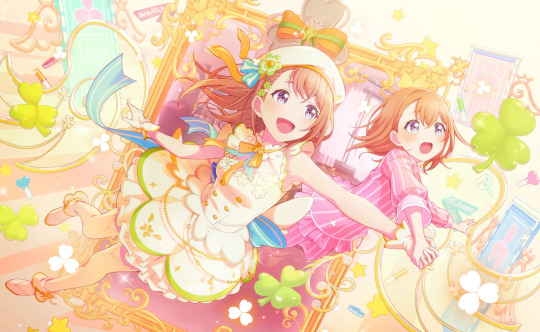
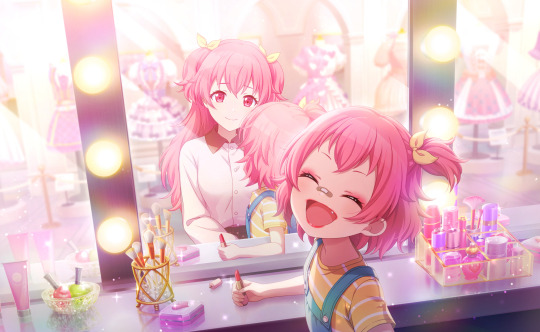
#project sekai#project sekai colorful stage#hatsune miku colorful stage#proseka#prosekai#colorful stage#i didn't include toya's nocturne interlude trained card because while he is with his younger self#they aren't really interacting together? they're both just there playing their respective instruments#i want older toya to show younger toya that he found something someone that made him happy and enjoy music#i want to see older ena helping little ena with a drawing like she did for those school kids with emu and honami#i want to see older tsukasa put on a show for his younger self#or even just tell him that he's found more people who would help him pursue his dreams#saki holding her younger self the first night she has to spend in the hospital#honami baking with little honami#kanade holding out the music box (i can't remember if it was her mom's or her dad's) so her younger self can wind it up#mafuyu carrying her younger self away from something that looks harmful towards something that says safety#ichika telling little ichika all about leo/need's sekai and miku#emu is telling her younger self all about wxs and how they helped her save the wonder stage#do i need to go on?
884 notes
·
View notes
Text
DPXDC Prompt #53
John Constantine had a son and he knew he did. He also knew his line of work was dangerous and he didn’t want his son to get dragged into it and possibly hurt or used against him. John left him in the care of his cousin Madeline Fenton, they always wanted a son but couldn’t have anymore after Jazz, their daughter.
John made several deals in his time especially with those in the infinite realm, he wanted to get warding charms to hide his son’s presence as well as get a tracking spell, he’s approached by Clockwork the ancient of time. He’s promised a spell that allows him to tell when his son is hurt badly or dead however his son becomes the king of the infinite realms upon his death. John felt very hesitant about taking this deal but goes through with it for the sake of Danny.
no one but Clockwork knew what was to happen shortly after Danny’s 14th birthday but it does make Constantine teleport to his side where he finds him alone in a crater where his house used to be. He’s taking his son to the Watchtower med bay.
#dp x dc prompt#dp x dc#dc x dp#danny fenton#danny phantom#john constantine#clockwork knows what he’s doing#Everyone else dies including Sam and Tucker#John kidnaps his own son#He brings him to the watchtower#Dealing with new ghost powers on a space station sounds like a terrible idea#John doesn’t know what he’s doing but he doesn’t realize his sons half dead#Half dead counts in clockworks eyes#I’ll post my art soon#I’ve decided that I also want to add to those prompts as well#Maybe not full story’s but definitely lengthened#I drew cat Danny knocking over a cup and staring out the window into space#Self lore? I grew up with several wall scrolls on my wall including a Tenchi Muyo one where they’re all in bikinis#All of them were my dads
623 notes
·
View notes
Text
i love creature batman. no body just his pointy ears and eyes. he’s not even human. he can probably fly. he makes no noise when he moves. how he procures a seemingly endless supply of human children is a total mystery, but they seem to love him, so rescue efforts are usually ignored.
Commissioner Gordon, standing on a rooftop with a cup of coffee and a megaphone: Tim Drake, get away from the Batman. You have human parents and they are going to be very worried about you
Tim, sitting in Batman’s lap as a spindly, clawed hand affectionately pats his head: YOU’LL NEVER TAKE ME ALIVE, JIM
#in my head he Lowkey kidnapped dick and Jason but then they realized that he’s pretty chill and very warm to sleep on so they like him#when jason dies Tim just abandons his whole human life and offers himself up#what does Bruce look like under the cape? no one knows. all you see is the eyes and the ears and occasionally a clawed hand#he is a very good dad yes he loves his little nestlings. he always needs more. give him more#he doesn’t know what dollars are give him a toddler#cass is also a Creature all the other ones are humans#yes including Damian#girldad things#batfam#Bruce Wayne#Tim Drake
468 notes
·
View notes
Text
Sokka's sexism
Sokka’s sexism from the earliest episodes is an interesting case, because the Southern Water Tribe, at least from what was presented to us on screen, doesn’t seem to operate that much on gender roles? Especially when compared to the Northern Water Tribe?
I mean, yeah, warriors (men) went to war, while women, children and the elders stayed at home. But as Hama’s story shows, when Fire Nation attacked Southern Water Tribe, both female and male benders were fighting against invaders arm to arm and it seems like they were the actual first line of defense there, not the non-bender warriors.
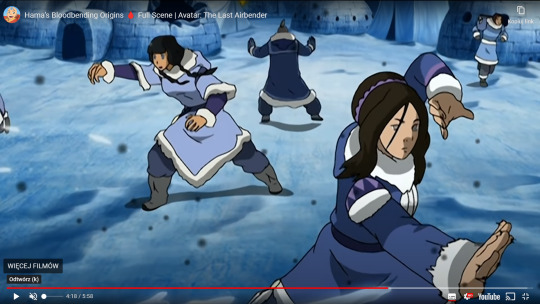
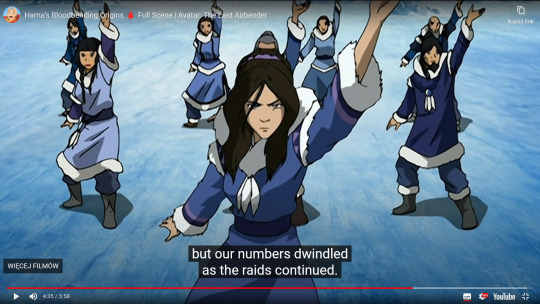
In contrast, during siege of North Pole, in the final of Book 1: Water, we don’t see any female bender helping defend their home except Katara, who was involved in protecting Aang when he was in Spirit World.
Since all the waterbenders were captured from the Southern Tribe, it makes sense that non-bender warriors stepped in and got involved with war, while the kids and elders were left under women’s care.
Another example comes from “a ceremonial test of wisdom, bravery and trust”, known as ice dodging. As Bato explained, it is a rite of passage for young Water Tribe members and in their village “done by weaving a boat through a field of icebergs.” When a child turns 14, their father was supposed to take them to ice dodging, so they could earn their mark. Though the episode itself was focused on Sokka’s ceremony, Bato never specified it as something that boys alone should do and not only Katara (girl) but also Aang (outsider) is allowed to take part in the ritual. Once Sokka proved himself, everyone of their group got a mark, as a sign they passed the test. Interesting thing to note, since Bato did not specify it is a rite of passage for boys alone, it suggests girls were expected to know how to sail in boats of the Southern Water Tribe. Of course, again, war didn’t allow to continue this tradition as men (Hakoda, in case of Sokka & Katara) left to fight against Fire Nation.
Later, when Sokka and Katara reunited with their father, Hakoda did not try to send away Katara nor relegate her to just a medic job during the invasion. In Northern Water Tribe episodes, we learned that teaching for waterbenders there was defined by gender - women were allowed to learn only how to heal, while men how to use their bending in fight. Hakoda, nor Bato nor other of their warriors even for a moment questioned Katara’s presence on the battlefield nor the presence of women in the ranks of their allies like a blind, 12 years old Toph or the female water benders from Swamps or female(?) soldier from Earth Kingdom
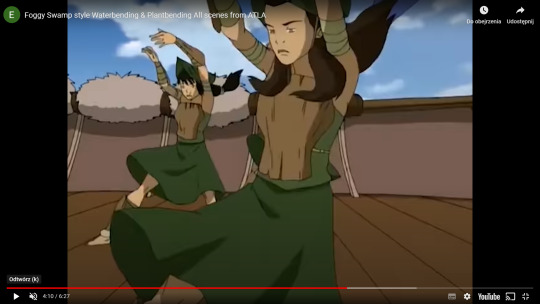
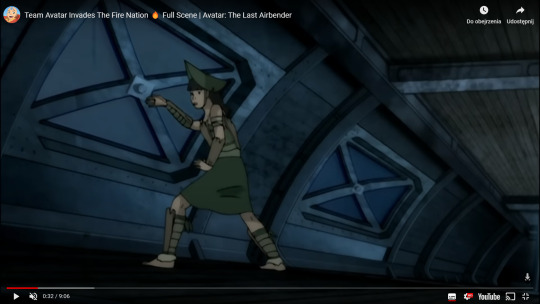
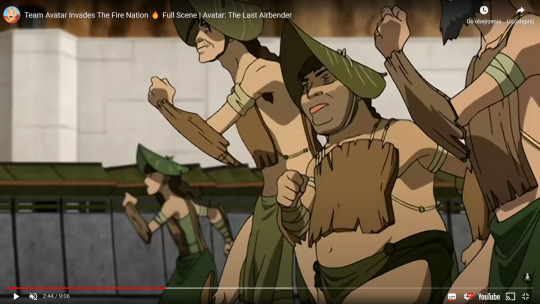

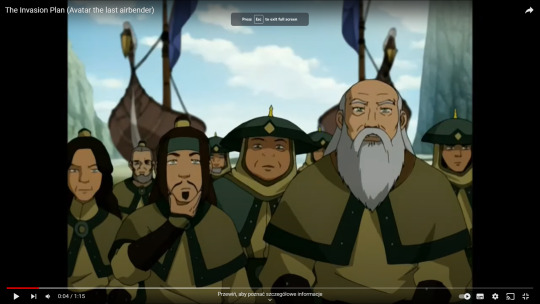
And during battle, Katara did not fight in rank with other soldiers, she first alone secured Appa during submarine attack, then alongside her brother and father took down guardhouses - Hakoda himself told her and Sokka to attack one when he took down the other one
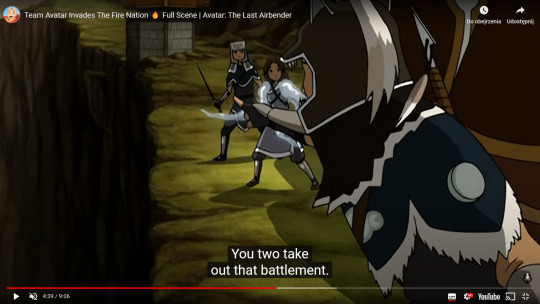
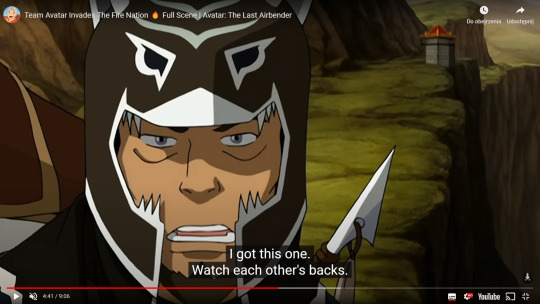
showing how much he trusted his 15 years old son and 14 years old daughter while ordering them attack on Fire Nation adult soldiers hidden in well guarder place.
Later, when Hakoda got seriously injured and Sokka temporary took the command of their forces, we could see that Hakoda relied on Katara to follow his troops and not ever once tried to send her back “to safety” or argued she should leave him behind, as often it happens with heroic (male) figures. Quite the opposite. When Katara offered him to “wait here if you want”, Hakoda firmly said “I want to press forward with the others”, which meant his daughter needed to come with him directly into an already ongoing fight (even if they stayed more at the rear of their army, they were still on battlefield).
She and her brother, alongside with the youngest members of Invasion, were forced to flee on Appa once the battle was lost, but no other adult woman was included. During Zuko’s coronation, when all war prisoners were released, in the background we could again see the female character(s) from Swamps.

And let's not forget how impressive Hakoda was by Suki when she single-handedly captured the warden at Boiling Rock prison and did not try to stop her from fighting against Ty Lee alongside Zuko and Sokka against Azula.
Understandably, we have no idea how the Southern Water Tribe and its culture looked like before the war, even arguably, the characters themselves may not have a clear idea due to growing up in dire times. But my point is, Hakoda and Bato, the two main adult Southern Water Tribe’s warriors that Avatar: The Last Airbender allowed us to know more about, have never shown any direct sexism toward Katara or other female characters. And though Sokka was the oldest boy at their village, there is no reason to think women did not hunt in absence of men, because one person would not be able to provide for a whole community 24/7. Also, as Hama proved, the Southern Water Tribe’s waterbenders were capable of fighting and their gender did not play any vital role the way it happened in their sister tribe at North Pole.
Of course, Fire Nation’s repeated attacks affected residents of South Pole and their living conditions but from the little bits the show gave us, I think it is correct to assume if Sokka grew up with Hakoda around to guide him as he should, his behavior would be different from the sexism and dismissive attitude toward Katara or Kyoshi Warriors. For one, logically thinking Southern Water Tribe’s warriors need to do all the cooking, sewing and keeping their camp clean all on their own during war so it is not a “girly job” but a vital part of a warriors skills to survive and ensure their equipment is in the best condition. But Sokka doesn’t know it, because there is no one to teach him the importance of those skills. All Sokka had was father’s farewell words to cling to - and I’m not sure if Hakoda truly expected his son to be able to protect Katara and the village in his absence, or he just tried to make Sokka feel a bit less depressed about being left behind. You know, by giving him purpose and a Big Important Job to focus on and to feel needed and trusted.
Which leads me to think that Sokka’s sexism is not rooted in Southern Water Tribe’s culture itself, but in his own insecurity and pressure of being the oldest boy in the village. If girls could be warriors - and be better than him - it would put into question all his self-worth, purpose and the trust given by father. Once Sokka met Kyoshi Warriors and later all the skilled girls, it challenged him on a very personal level, but he accepted the truth and moved on and alongside, finally became a true warrior and a man.
And I find it indeed an interesting case, as Sokka’s sexism and dismissal of girls is not necessarily stemming from the culture he is part of, but rather is the effect of not knowing said culture & pre-war history of his Tribe. And of course, from his own insecurity.
#atla#avatar: the last airbender#sokka#hakoda#just some thoughts#because bato and hakoda seems pretty okay toward katara and include her in rite of passage for sokka and invasion battle#like her age and gender doesn't matter#with dad and dad's friend (bato) like that where comes sokka's dismissal?#so i guess this is about sokka's insecurity and growing up without father to guide him#good suki straighten sokka up pretty quickly#i'm pretty sure SWT has some sense of gender roles but not so strict take like northern water tribe#no arranged marriages and no true aristocracy and waterbenders being fighters and so on#sokka though lives in destroyed by war tribe to understand yet what was done to his community i guess?
177 notes
·
View notes
Text
Kabru/Toshiro: A DunMeshi Ship Analysis
Kabshiro has been gaining more traction recently, so I'd like to dive into their canon dynamic and how a relationship between them could progress and benefit them both in the long run!
In my opinion, the main draws of this ship are:
Communication: Kabru's ability and willingness to identify and engage with Toshiro's true feelings and motives, Toshiro's consequential willingness to express himself to Kabru, and vice versa
Trust: The almost immediate trust they place in each other, despite their reservations
Canon Friendship: How naturally yet rapidly their canonical friendship develops, especially considering their characters (read as: their intimacy issues)
Growth: The potential for a) Toshiro to grow as a person by trying to be more expressive and caring towards someone who cares for him and b) Kabru to experience reciprocal effort and care from someone else when he's used to caring for everyone else
Bonus: I love to see queer men of color in love <3
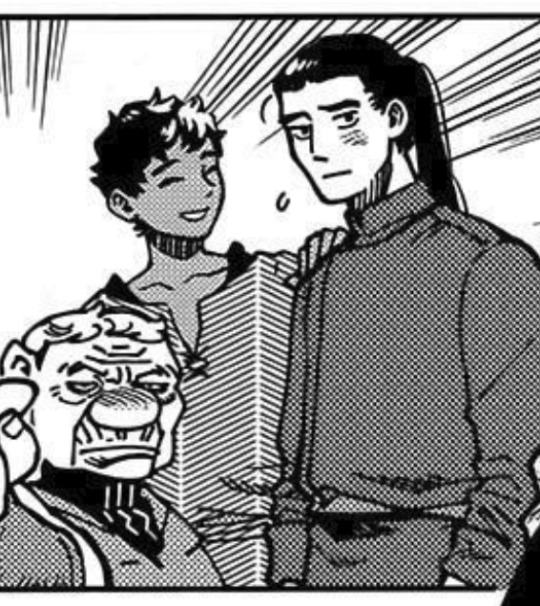
1. Communication
Kabru is the character with the fastest and most accurate read on Toshiro's feelings and motives. This means little on its own, considering Kabru's skill is assessing people and giving them what they want as a means to his own ends. Initially, Kabru engages with Toshiro essentially to reach Laios. He hears Toshiro's retainers discuss Toshiro's love for "that girl from the North" and recognizes that if he offers to help Toshiro rescue Falin, he can get to Laios. As he does with most people, Kabru identifies Toshiro's goals and uses this knowledge to propel himself towards his own goals.

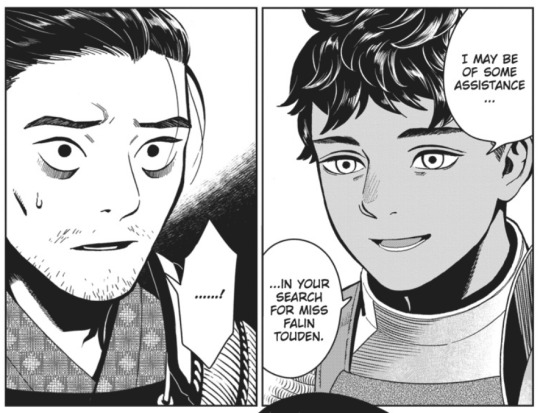
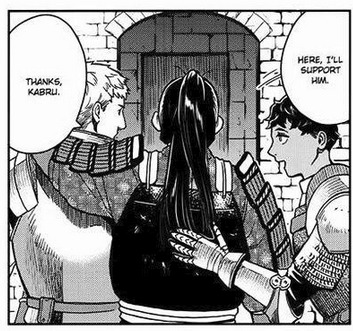
During Laios and Toshiro's conflict over ancient magic, Kabru again steps in. He de-escalates a situation where Toshiro quite literally has his tachi against Laios' neck by acknowledging Toshiro's concerns regarding ancient magic and reminding him of his actual priority: Falin. While his dialogue sounds harsh, Kabru still validates Toshiro's worries. His acknowledgement and engagement with Toshiro's actual feelings isn't something that Toshiro often experiences. In part, this is because Toshiro doesn't express himself, but we'll get into this more later.
From Kabru's perspective, reading and responding to Toshiro effectively is reflective of his usual habits and strengths. But their respective reactions to Kabru's de-escalation exchange remain notable. Toshiro tells Kabru to not finish his statement — the first glimmer we receive into Toshiro openly expressing himself to Kabru at a greater level than he does with other characters. Kabru immediately switches to looking relieved and sympathetic. He apologizes to and comforts Toshiro, establishing a foundation of genuine care and consideration between them.
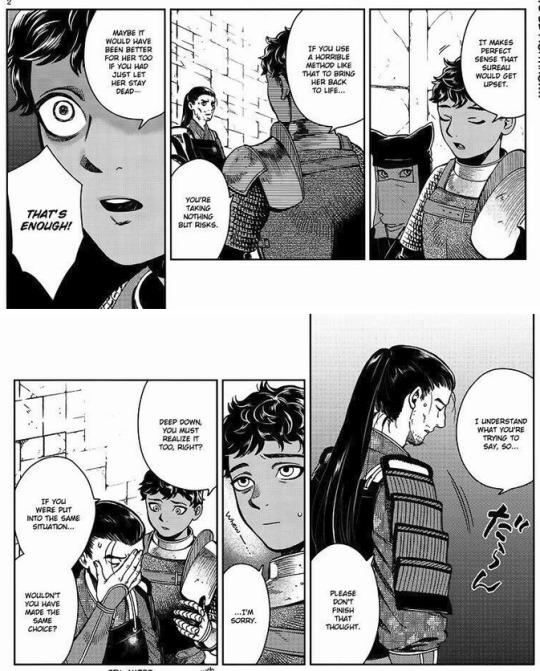
2. Trust
After they leave the Dungeon following the first Faligon fight, Toshiro asks Kabru to go with him to the governor's house. Despite their only recent acquaintance, Toshiro expresses a need he has to Kabru, even if it's not a very personal one, and he trusts Kabru enough to rely on him in a high-stakes situation. (As a sidenote, Kabru telling Toshiro to "Please get some rest" is a sweet moment, considering both of their fraught relationships with self-care.)
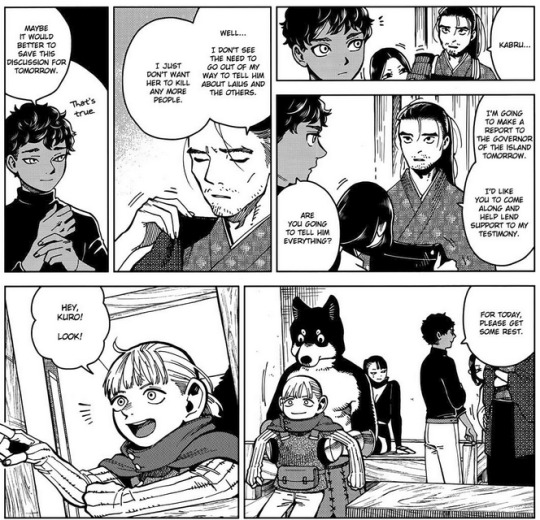
Kabru trusts Toshiro in return. We as the readers don't learn about Kabru's backstory and how it drives his actions because he tells his own party or Laios. We learn about his past because he tells Toshiro.
Kabru addresses Toshiro by name before he recounts the death of his family and his haunting questions surrounding it. When he turns back to face Toshiro, he looks visibly determined and quietly enraged at the injustices he's experienced in his life for the first time during the narrative. Kabru does share his story to convince Toshiro of his position, but his straightforward, vulnerable delivery of his story and the emotions he has surrounding it speaks volumes towards the trust he has in Toshiro. He believes Toshiro will see him and stand by him.
Also, prior to Kabru sharing his backstory, Toshiro questions his motives multiple times. While Toshiro also questions Laios' actions, Toshiro feels comfortable enough to communicate with Kabru even when they might disagree and he isn't under duress.
Within the first few days of knowing each other, Kabru has witnessed Toshiro at some of his lowest points: passing out due to hunger and sleep deprivation and fighting Laios. Because Kabru has already seen him at his lowest and hasn't treated him worse because of it, Toshiro seems more comfortable engaging with Kabru than with many other characters. Toshiro's attempt to throw the companion bell away is a funny moment, but it also demonstrates how he's fine with acting impulsively in front of Kabru; he doesn't hold back as much as usual. He's likely also realized that Kabru can see past his reserved front.


After they speak to the Canaries, Kabru asks Toshiro to help him seal the Dungeon. Although Toshiro had originally planned to go back to Wa, he agrees to help Kabru. Compared to their initial meeting where Kabru was only using Toshiro to get to Laios, Kabru seems to genuinely want Toshiro and Namari on his side, telling them, "I'm counting on you." Both his request for Toshiro's help and his easy agreement demonstrate a surprising level of trust for how long they've known each other.
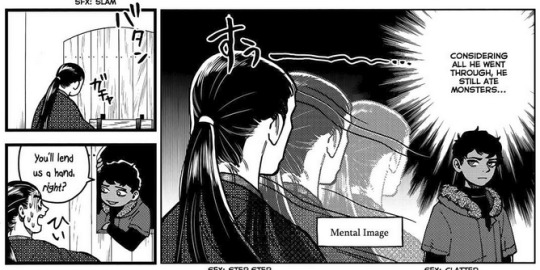
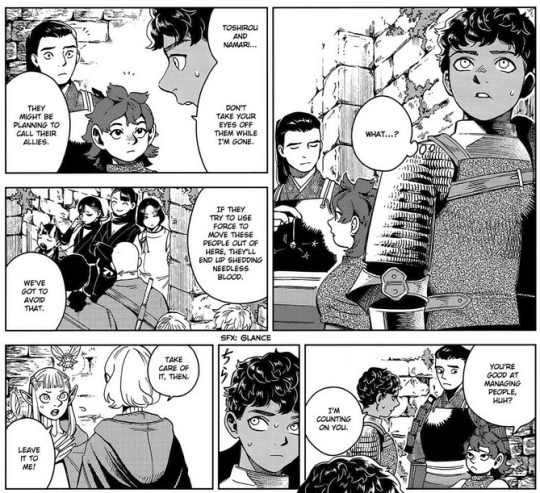
3. Canon Friendship
Neither Kabru nor Toshiro regularly open up to the people in their lives. We get the heart-to-heart between Toshiro and Laios after their fight, but other than that, Kabru and Toshiro are not very emotionally open even with people they've known since childhood like Rin and Hien. Kabru maintains his charismatic facade around Rin, and Toshiro has distanced himself from Hien in their adulthood. Because both of them struggle with being vulnerable, their friendship becomes close interestingly fast.
Beyond feeling comfortable around each other for the previously stated reasons, I'd suggest that the ease they feel around each other partially arises from their shared identity as Asian men and immigrants to the Island (Note: I read Kabru as South Asian). As a queer Asian man myself, there's sometimes an immediate sense of ease between people whose identities and experiences overlap.
Before they ever meet, Kabru explains Toshiro's background to his party. He opens with Toshiro's outsider status, drawing the reader's attention to the parallel between Toshiro being an outsider in his household and Kabru being an outsider as a tallman who was raised by elves. In this scene, Toshiro is also the only member of the Touden party whose motives Kabru ponders aloud. With Laios and Falin, Kabru simply declares them "not good people." Considering Kabru is intrigued by people he doesn't immediately understand, it's not difficult to assume that though Kabru approached Toshiro because of Laios, he was also interested in Toshiro as an individual.
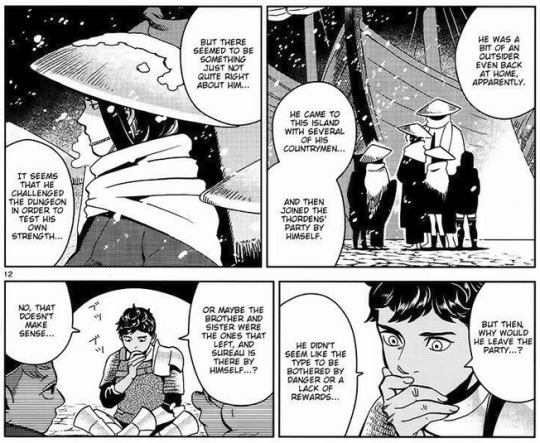
After they join forces, Kabru and Toshiro frequently appear together in the story. The evolution of their dynamic can be seen through the mangacaps below. Initially, despite their trust in each other, they're still a little suspicious of each other. As time progresses, they develop a language of silent glances and casual touch. We often see them standing beside each other and exchanging looks after Laios speaks. Considering how Toshiro doesn't often voice his negative opinions and Kabru makes an effort to curtail his negative reactions around Laios, the fact that they've both taken to expressing silent concern for Laios to each other shows that they've reached a significant level of intimacy in just a week or two.
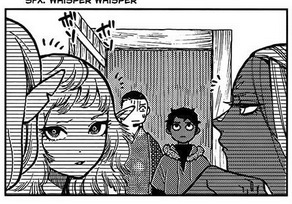
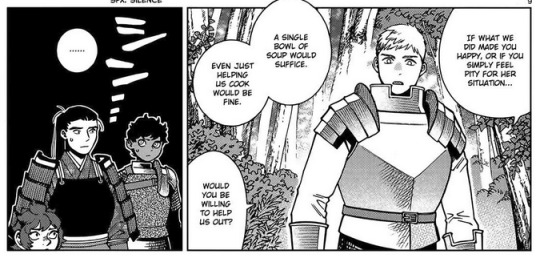
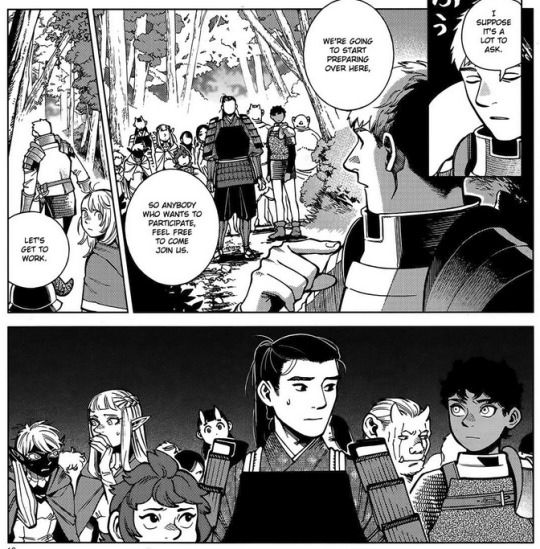
Since they're both men of color and Kabru is one of the only characters who doesn't call Toshiro "Shuro," they've likely discussed Laios' microaggressions towards Toshiro and bonded over how they find his sillier behavior of eating monsters disturbing. They also both care for him as a friend, so Laios remains another point of connection for them.
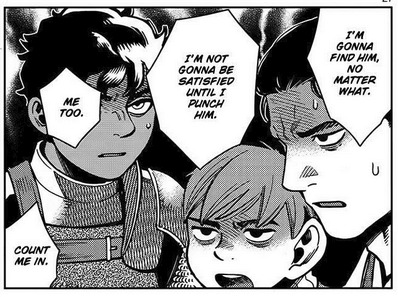
At the banquet, they sit beside each other, and when Falin revives, Kabru comforts Toshiro via a hand on his shoulder. The canonical affection between them is easy to track and consistent by the story's close.
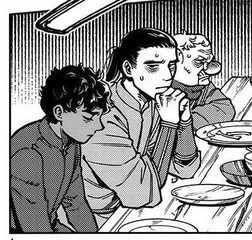
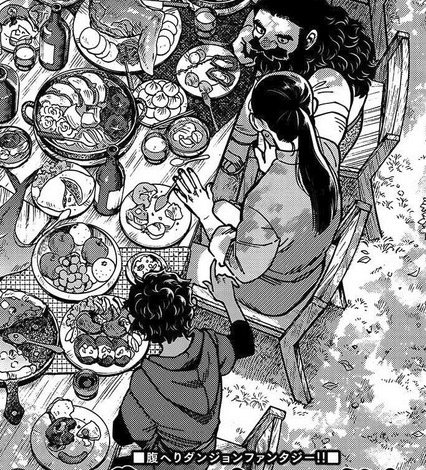
4. Growth
As stated by @malaierba in their platonic kabshiro post, Kabru and Toshiro share narrative parallels like being raised by surrogate mothers, over-analyzing social situations, attempting to act in others' best interests at the cost of their own, and being terrible at basic self-care (I'm also realizing we both touched on the de-escalation and Kabru backstory scenes, lol). Both characters are actually extremely similar in the way they conceptualize themselves.
Kabru and Toshiro both avoid offending others by suppressing their discomfort. This behavior is deeply rooted in their backstories and their identities as people of color and immigrants. When you're the outsider, you don't have the luxury of acting as you please. Society expects you to keep your head down and not "cause a fuss."
They both fear selfishness. Kabru is the archetypal sacrificial hero; his goal is equality between the races and minimizing mass death no matter the personal cost to himself. On a much smaller scale, Toshiro tries not to burden others. They both forgo intimate relationships and falsify parts of themselves to accommodate others. Their willingness to minimize themselves for others' sake leads to them to not even canonically care for themselves and becomes a form of passive self-harm.
Toshiro doesn't eat or sleep during his rescue of Falin in what seems like a self-inflicted punishment for failing to protect her and save her. He seems to believe that he's only useful for what he can do and in particular, do for others. He seems to struggle to define himself outside of how he's overshadowed and overlooked by his charismatic father. Toshiro's arc is about learning to identify his own needs and wants, pursue those things, and express himself.
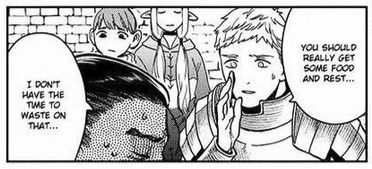
Because of how charismatic Kabru is, Kabru appears to have a secure sense of self, but I'd argue that he falls into the same trap as Toshiro. When Laios becomes the Dungeon Lord and seems to be ending the world, Kabru blames himself, saying, "What purpose does my surviving Utaya's tragedy have?" and "Please just kill me right now." Kabru hasn't ever established what he wants for himself outside of what he can do for others, just like Toshiro. While Kabru is far more active than Toshiro and his goals are more heroic, his arc is similarly about identifying his own needs and wants and expressing them as demonstrated by his confession that he wants to be Laios' friend.
Like Toshiro, Kabru is disconnected from his desires because he doesn't see himself as worth prioritizing over the greater good. He fails to regularly eat and clean his living space.


Kabru and Toshiro's friendship challenges both their negative habits of self-perception. Unlike with Laios, Toshiro wasn't quite as pivotal to Kabru's goal, so their relationship develops without as much pressure. Because of the extreme circumstances of their first meeting and their compatibility, they express their true feelings towards each other nearly from the onset, and by the banquet, they seem to hang around each other just for the joy of the other's company. When their friendship extends into a romantic/sexual relationship, they get to knock down yet another barrier to pursuing what and who they want simply because they want to.
In addition, because Kabru is the first person to care about Toshiro in a way that doesn't infringe on his boundaries, Toshiro would hopefully be motivated to become an active participant in their relationship. His efforts to be more emotionally open in order to support and care for Kabru would help him overcome his fatal flaws of passivity, especially in interpersonal communication, and walling himself off from others. But most importantly, Kabru would receive the same amount of care he invests in learning about and accommodating other people from someone else.
Toshiro is also an observant person. He's good at mapping out social situations to avoid conflict, and he is empathetic. With a little encouragement, he could easily turn skills he's used to pouring into his defense mechanisms towards actually reading his loved ones and engaging with their emotions and needs. If Toshiro was consistently clocking Kabru's actual reactions to things and trying to address his desires, Kabru would realize that he doesn't have to play a part all the time. He would learn to be more authentic and vulnerable in his relationships.
Notably, Rin does support Kabru, but he doesn't really accept her love or act vulnerable around her for a multitude of reasons. This is probably a good time to note that Kabru and Toshiro are both sexist. I want to believe that a healthy relationship between them would encourage them to mature without demanding emotional labor from the women in their lives, and by proxy, improve their relationships with Rin, Hien, and the other female characters. Personally, I really enjoy the idea of Kabru, Toshiro, Rin, and Namari getting close and bonding over being Asian.
5. Bonus
Because their identities as Asian men and immigrants impact their characters, their relationship has a unique type of intimacy. On a societal level, there isn't a lot of media about two characters of color in love. It's even rarer to see two queer characters of color in love in Western media (or Asian media like DunMeshi with an ethnically diverse cast) as oftentimes, the West falsely equates queerness to whiteness. I consider Kabshiro to be my personal contribution to making queer Asian characters kiss and decentering that white man /hj. I'd love to see more Kabshiro content!
Overall, I just think it's beautiful that these two characters who've resigned themselves to loneliness in completely opposite ways can overcome their intimacy issues to trust and care about each other. I like that being together is easy for them in many ways, but unlearning their habits of constantly putting on a front and rejecting vulnerability or not putting effort into relationships out of preemptive fear of failure still takes work. I like that their relationship is an intentional one where love takes effort, but the effort is part of the love.
₍ᐢ. .ᐢ₎ ₊˚⊹♡
If you read this entire meta, thank you so much, and please feel free to reblog and/or send me an ask with your Kabshiro thoughts! As a shameless plug, you might enjoy my canon-compliant Kabshiro fanfiction that spans from the banquet to a few months post-canon. There's both an explicit version and a version with fade-to-black sex scenes. You can expect:
Kabru and Toshiro's silly friends-with-benefits era
A resolution for Toshiro's feelings for Falin, lol
Toshiro's difficult relationship with food
Kabru trying to 5D-chess everything, and Toshiro overthinking and catastrophizing <3
Kabru, Toshiro, and Laios being friends! They are silly and well-meaning and do their best to support each other
Kabru and Toshiro unpacking Laios' racism
Extremely homosexual moments of tenderness
Kabru, Rin, and Toshiro trio and Namari and Toshiro duo friendship tidbits
Kabru and Marcille becoming friends and bonding over gossip
Angst with a happy ending and more!
#kabshiro#kabushuro#kabru#toshiro nakamoto#shuro#dungeon meshi#delicious in dungeon#dunmeshi meta#dunmeshi analysis#wehehe im so glad to finally get this out#if u talk to me about my fanfiction ily forever#kabshiro stans wya#also this is kinda cursed so i didn't include it but uhhh the way toshiro feels like he'll never measure up to his charismatic dad#and kabru is like charisma-maxxed out is#that's something#something is there#i'm not unpacking it tho LOL#this is a ship post but i feel like basically all of it applies to their platonic friendship as well#dunmeshi#*meta#*mine
104 notes
·
View notes
Text
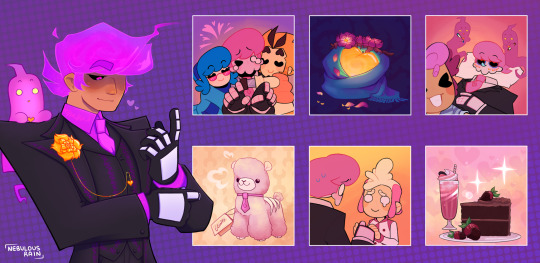
HAPPY LATE HOLIDAYS @ruebeary !!!!!!!!!!!!
you want lewis ur gonna GET it babeyyyyy. but i didn't wanna leave everyone else out so i kinda sprinkled them all over :) HOPE U ENJOY !!!
(thank you sm to @msaholidayspirits for hosting !!!)
#nebbie's sketchbook#msa#mystery skulls#mystery skulls animated#MSAHolidaySpirits2023#lewis pepper#arthur kingsmen#vivi yukino#deadbeats#mr pepper#belle pepper#this could be taken as either platonic or romantic lewvithur#didn't know how u felt about them but i wanted to include them either way#up to u! :)#arthur made him a lil plushie#and lewis is worried about scaring his dad SOBSBDBS#his dad just seems like the anxious type#a lil taste of everything#i really hope u enjoy!!!!#i'm sorry i'm so late :') this took forever#i try to outdo myself every year#and i also got covid so that was fun#anywho#💖💖💖
350 notes
·
View notes
Text
Would it be interference if...
Hermes sent Luke a sign that he was watching over him?
Hermes comforted his son after his failed quest and told him through mail or in person that he still loved him and was proud of him?
Hermes showed up once for Luke's birthday?
Hermes left his son under the care of another guardian?
Hermes just talked to his son period?
Hermes called CPS on May? Or subtly led the police to the house?
Hermes gave his son a hug instead of telling him he shouldn't have come home and kept his mouth shut about Luke's bad fate?
Hermes gave Luke a quest that showed he actually cared about his son?
#similar actions were done by other godly parents by the way! including hermes!!!#but for effing Percy and not his own damn son!#hermes can comfort percy about his dad but he couldnt muster up the same comforting energy for his own suffering kid#pjo hermes#luke castellan#percy jackon and the olympians#feel free to add more#pjo hermes is a questionable father#which is a freaking shame because hermes had the potential to be best godly father#luke castellan deserved better
17 notes
·
View notes
Text
Incorrect quote#
(Dad jokes)
Niece : uncle, i'm hungry.
Heniroksoo : hi hungry, i'm uncle.
Niece : ...
Invisible cjs : .....
GoD who's watching : ......
<<<<<<<<<<bonus>>>>>>>>>>>
Niece : *open team 1 whatsapp gp* hello, my uncle's bullshitting again. Send help
Heniroksoo : WAIT WAIT DEAR IM JOKIN-
#heniroksoo would def cracks up some dad jokes#100% serious#team 1 def included niece in their one whatsapp group tittled “Team leader bullshittery”#it's a place to vent about their lovable but frustrating team leader#niece is the one they go to when team leader went out of control#also the place niece go to to vent about her chaotic uncle#it's symbiotic relationship#team leader shoud stop making hospital his vacation house#original cale henituse#team 1#niece
77 notes
·
View notes
Text
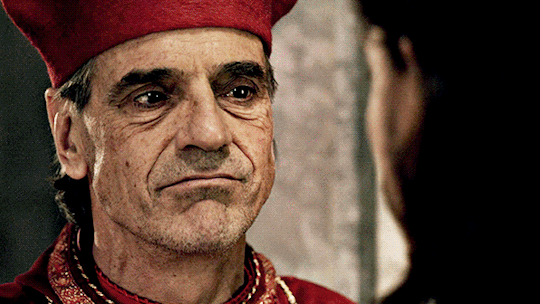
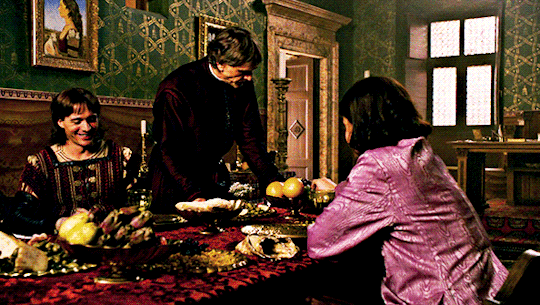
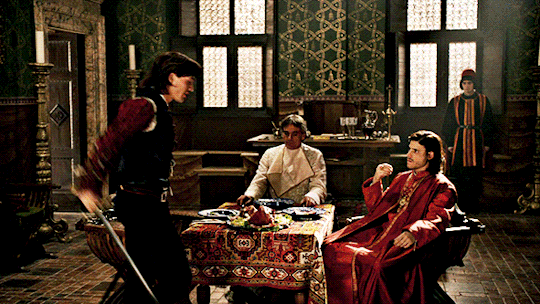
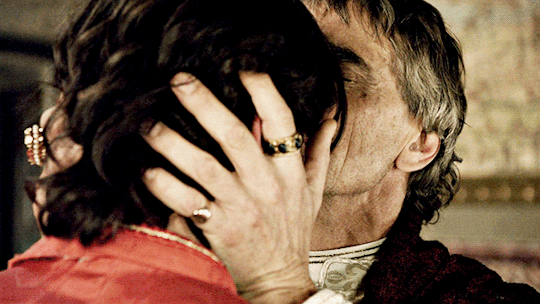
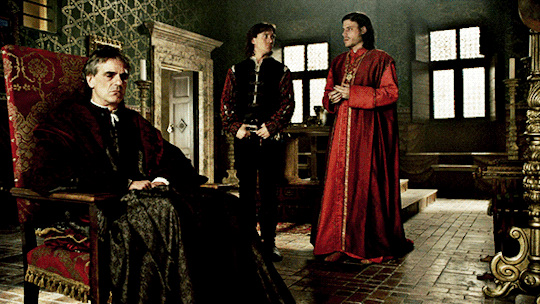
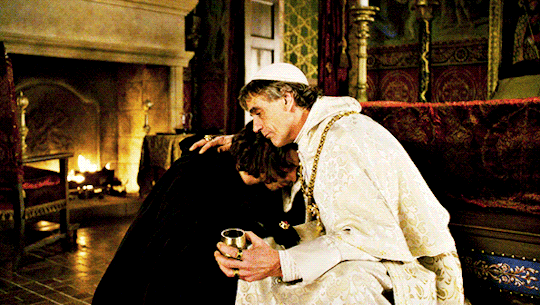
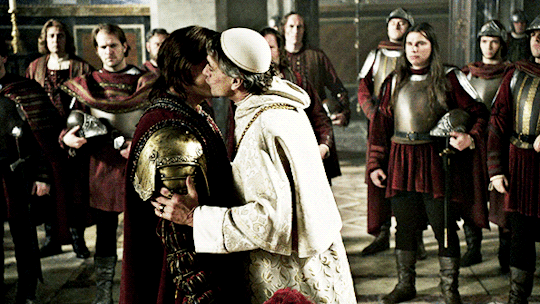
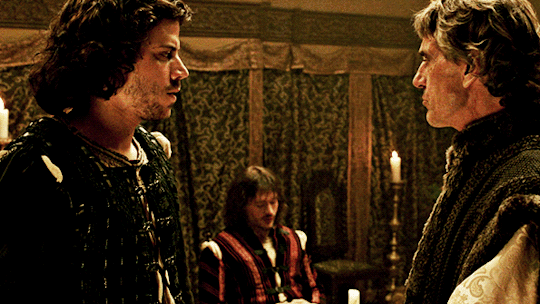
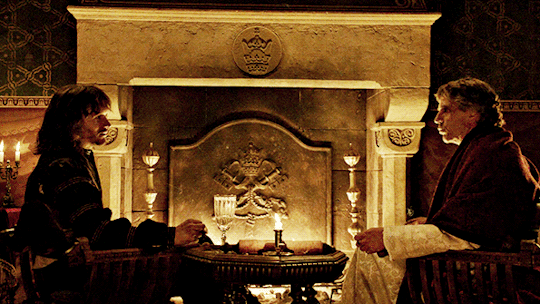
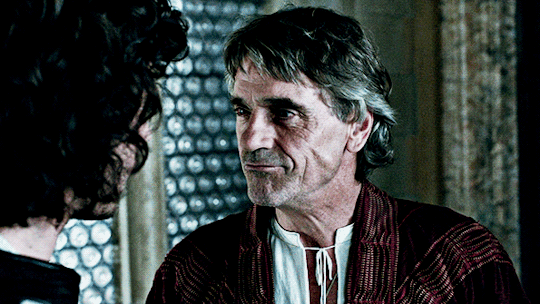
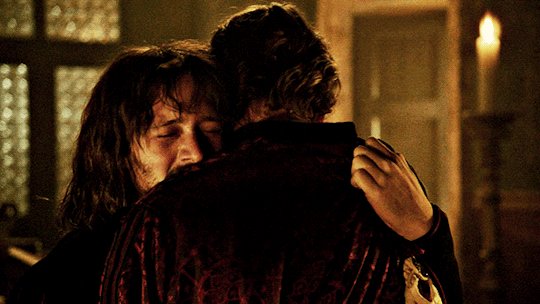

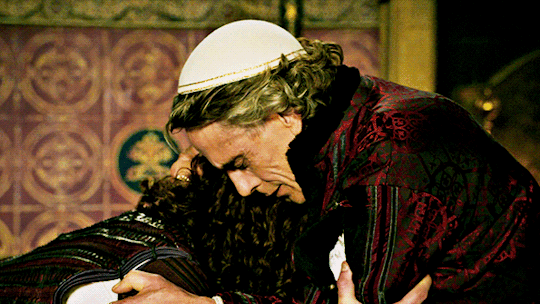
RODRIGO BORGIA + his beloved sons
"I remember the joy of holding [Juan] in my arms. A brother for little Cesare at last."
#THEY'RE HIS BABY BOYS#he loves them so much yet he fucked their lives up rip.what ces doesn't realize is that despite his dad “favoring” juan...#it's him whom he trusts. and it took him killing juan for rodrigo to set him free from being a cleric.#if ces only knew his dad had bigger ambitions for him. he wouldn't have hated juan who loves him#things wouldn't have led to juan's death. he made ces believe that he wasn't loved by him when he does love him immensely and admires him#but decided to appointed juan a task ces has always wanted which resulted him to hate his little brother who is lost and misguided#for juan's case he never asked for the position he was given but tried his best to impress and honor the family#despite his dad's love he felt very isolated. he loved his family deeply and all he wanted was to be included in their own world#but was extremely bad at expressing it and ended up being shunned and never mourned. tragic fate indeed#david oakes#juan borgia#rodrigo borgia#cesare borgia#jeremy irons#the borgias#theborgiasedit#perioddramaedit#smallscreensource#juan and rodrigo#by jen
398 notes
·
View notes